#because people keep getting me those
Explore tagged Tumblr posts
Text
And recipe nine of me trying to cook all the way through all three of the newer Star Wars cookbooks, Rorkid Bread, from the Life Day cookbook:

AKA garlic knots. They’re. They’re garlic knots.
Weirdly comforting to know that Ewoks—all three of these books are in-universe cookbooks, and rorkid bread is an Ewok recipe in that fiction—have garlic knots.
So, yes, they’re garlic knots with a little matcha (still using mulberry as a substitute, since now I’ve got a huge bag of mulberry leaf powder to get through) sprinkled on top, but they’re really tasty garlic knots. Garlicky, buttery, herby, and pretty easy to make, as far as bread goes. Would recommend.



Also, see that nice helpful picture on how to make them? You know where that would have been great?? On the five blossom bread recipe. Would have been great to have that on the five blossom bread recipe.
(Especially since the Life Day cookbook has, on the whole, the weirdest layout. Text placement is odd at times and there are pages with short recipes that are mostly empty where pictures could be, but are otherwise empty. I like all three of these cookbooks, but the life day cookbook is the one where the presentation is slightly phoned in at points.)
#gffa recipes#cooking through the gffa#I also made a squash and goat cheese bake from a different fan cookbook#because people keep getting me those#and that was also very yummy#also tried to make pork chops but those were less successful#I have a bad habit of overcooking any meat I put on the stove#because I’m constantly going ‘oh is it cooked I don’t want to undercook it and make everyone sick’#and then too long of a time later I am sadly eating leather#but the space garlic knots and squash bake were both good! so
6 notes
·
View notes
Text

find another role, carry on the show
#EDIT IT DIDNT SAVE MY TAGS. hey so this post got a thousand notes huh. interesting. surely nothing will change#i'll leave all the old tags. for my thought process. and its kinda funny#take a bow stupid idiot (throws a tomato at them)#in stars and time#isat#siffrin#siffrin no middle names no last name ദ്ദി ˉ͈̀꒳ˉ͈́ )✧#... or is it. Smiles#i'd like to draw mira for her birthday but um (hasnt open artfight website in a few days) im scared.#also i have NICE ASKS TO ANSWER.... But im scared. give me a minute#Uawaaaaagh i drew this bc i was trying to animate a little bit but it just . Didnt look good. im not good ag 2d animation#tch. ill keep trying cause there ar e way too many songs that and now about isat because i have brain worms. i need amvs.#IM SCARED TO POST THINGS THAT ARE SPOILERY BECAUSE I WANT MY FRIENDS TO PLAY ISAT. BUT.#isat spoilers#in stars and time spoilers#sasasap#sasasa:p#WHAT IS THE PROLOGUES TAG.#tshirt that says 'i <3 killing the image in the mirror and taking its place' on the fromt#and a list of megan thee stallions tour dates on the back. お金稼ぐ俺らはスター#Im kind of tempted to edit this to be the versiom with the eyes. or maybe twt can have that. or. well#all of my friends are on twt (trombone slide sfx) so maybe thats where i should worry about spoilers.#ill see if i want to slap an eyepatch on them in the morning#Im one of those people who was like idgaf about twohats (lets it simmer for a week) Oh my god. Oh my god. Ohmy god#EDIT. i swapped it out for the Eyes version it should be fine as long as its tagged formspoilers right...#ill post eyepatch vers on twt partly bc spoilers but also ppl over there can be .. annoying ..... ....#i fear i would get 800 You Forgot The Eyepatch replies. PLEASE JUST SEE MY VISION.#[BANGING MY HANDS ON THE GLASS] HIS HAND. LIKE IN THE PROLOGUE. WHEN THEYE. HANDS. HELD[EXPLOSION
1K notes
·
View notes
Text
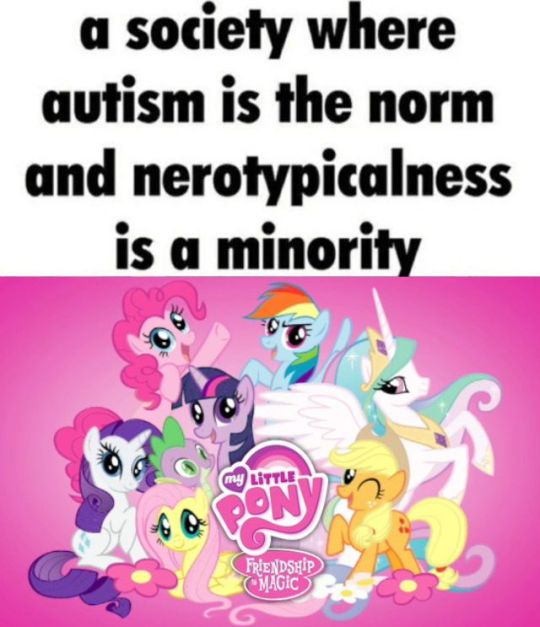
#t3rfs/r4df3ms dni#cuz i saw one reblog this#and she called me BESTIE#I'm not your fucking bestie#i have headcanons that would make your kind hurl#AND PR0SH1PP3RS GODDAMN DO I HAVE TO PUT A DNI FOR EVERYTHING FUCK OFF#i just saw the vilest shit on the recommended blogs for the last guy Jesus Christ.#one of those blogs posted flags and stuff and one if them was a fucking zoo flag#god should flood us again i think because what the fuck was that#ok uhh anyway get out if u can't keep it in ur pants around animals I guess#and children#what the fuck is wrong with people#mlp#my little pony#mlp fim#my litte pony friendship is magic#twilight sparkle#pinkie pie#rainbow dash#applejack#rarity#fluttershy#mane 6
2K notes
·
View notes
Text
new idea: shen yuan transmigrates into a pidw version with abo dynamics, but he doesn't know about it.
he knows what abo is, but it's so far removed from his expectations that it simply doesn't cross his mind at all. with that, cang qiong is a respectable, upstanding sect, so there is no growling, claiming, scent pushing or primal instinct stuff going on. people also don't mention it, as it's simply not relevant most of the time, and is considered rude to discuss unprompted.
shen qingqiu, of course, is an omega (the characters who make the best omegas are the ones who would hate it the most), but he has suppressed it with his qi for most of his life because he doesn't want to be seen as weak. the other peak lords assume he's a beta.
now, i'm not a traditional abo dynamic fan, but, there is something very appealing to me about the nesting and scenting aspect of it.
it starts out slow and painfully oblivious, with shen yuan assuming cultivators must have a really good sense of smell, and it's simply book logic that every character seems to have a signature scent. all those romance novels always mention characters smelling of pine and flowers and scotch and leather, so this isn't a foreign concept. liu qingge, for instance, is the bai zhan war god, girls fall for him left and right, it's only natural he smells of musk and deep woodsy notes, like the earth after it rains. right?
besides that, shen yuan has always been a homebody who loves his creature comforts, so him getting extra blankets and pillows and soft fabrics for his bed to curl up in isn't odd at all. or him collecting soft pretty things. shen qingqiu already has fans and night pearls and hair ribbons and silky clothes, so nothing changes.
then without-a-cure hits.
the poison breaks down the suppressors that the original shen qingqiu put in place, and his body starts restoring the balance. this worsens the cravings, and sets off his omega instincts.
he gathers more blankets, but it doesn't fill the need, like there's something missing. then liu qingge forgets his outer robe in his house after a meridian cleansing to deal with an emergency, and that robe ends up in his bed. he tries to reason it's a comfort thing—he wore his dad's sweater when he was young and had nightmares, and liu qingge does smell very nice, so is it really that strange that he holds it at night and presses his face against the collar where the scent is the strongest to soothe himself?
his own scent starts to develop as well, much stronger than the mild, watery green tea flavor from before, and people notice.
thing is, though, that there are many formalities and rules of conduct around omegas, one of which is not to bring up their status in any improper or unbidden way. so even though the alpha lords now notice a very distinct omega scent coming off their shixiong, they can't mention it out of societal pressure. so, they don't.
shen yuan still doesn't notice a thing.
the first time liu qingge smells it is during their bi-weekly cleansing session, when shen qingqiu leans in and liu qingge gets a mouthful of green tea, bamboo and honeyed jasmine, soft and sweet and pleased and so very content it sets off his alpha brain and he has to rein himself in before he starts releasing his own pheromones like some inexperienced teenager—
he's only just grown used to their amity and their habit of sharing tea and cakes after the cleansing, but now shen qingqiu is sitting there smiling at him and smelling like—like liu qingge is spoiling him and, making him feel safe...
he doesn't bring it up, downs his tea, and leaves.
meanwhile shen qingqiu keeps happily nesting away, filling his bed with all kinds of soft fabrics, some clothes of other people that he's trying really hard not to think about. everything is going well, binghe just turned sixteen and the girls are calling him an 'alpha', so his little bun is growing well into his protagonist charms! yue qingyuan comes by more often, acting a little strange but shen qingqiu is used to that by now. he looks very bashful offering him a ribbon of his, a pretty silver one that smells of incense and ozone, and shen qingqiu happily accepts it.
one time binghe comes back bruised and scuffed from a fight with bai zhan disciples, and shen qingqiu tsks at the strange smells on him, do those brutes ever bathe?? he rubs his hands over binghe's sleeves to try and get some of it off, and his poor bun must still be in shock because he stares wide-eyed at his shizun. he must also be getting forgetful because shen qingqiu finds that same robe still unwashed a week later in binghe's bedroom.
he also loves it when people brush or play with his hair, it's his favorite part of the evening when binghe helps him take down his hair for the night. the combs feel so nice on his scalp, if he could purr he would! (binghe's heart sobs quietly behind him, in complete disbelief his master is purring at him).
his icy, lofty demeanor has all but shattered, because now every time he tries to act aloof, like when yue qingyuan gives him a present or liu qingge shows up on his doorstep, his sweet, pleased scent betrays him.
the opposite is true, as well, when without-a-cure flares up and he's in pain and his scent goes sour and distressed, even when he's waving everyone off saying he's fine. the entire house smells of burnt tea leaves and ash after a nightmare, and shen qingqiu is very confused when liu qingge comes to pick him up for a meeting but then refuses to leave.
anyway he doesn't find out until after the conference when airplane tells him to keep his acrid scent under control, his house is starting to stink.
#yqy finds a robe of his in sqqs bed once and his alpha brain goes !!!!! and he cant stop preening for like. a month#sqq wonders if the original goods had cat genes or smth because he keeps wanting to rub his head against people for some reason#he just deserves to curl up in a nest of blankets and pillows and coziness#preferably with a mate or two or three#cuddling into them all warm and cozy and purring and being held as they call him a good boy and kiss his forehead#also shen yuan being woefully oblivious to societal norms is so delicious to me like getting super intimate bc he doesn't know the formalit#and yes he HAS ended up in someone else's bed before. either lqg or yqy both of whom would never wash that pillow again#alphas betas and omegas have absolutely been mentioned in sqqs vicinity it's just that it flew right over his head#''liu qingge is an alpha? why of course! he's the bai zhan war god! can't get more masculine than that!''#all he can think about is those youtube videos of ''how to be an alpha male to attract high value women''#svsss#abo#omega shen qingqiu#scum villain#svsss abo au#shen qingqiu#liu qingge#liushen#luo binghe#yue qingyuan#shen yuan#bingqiu
535 notes
·
View notes
Text

Remember: The burning sensation is part of the process.
#Mouthwashing#blood#body horror#Emphasizing here that this is in reference to a media and character and not a cry for help on my end.#Mouthwashing is one of those games that tickles my brain and checks all the boxes for my niche interests -#-but it wasn't something that got the silly comic part in my cortex firing up. My analysis brain is eating well though!#What said...It is impossible for me to see this scene and not say out loud: “Me in the middle of my work day".#While there is a lot more going on with curly I personally resonated a lot with his struggles with burnout.#Burnout feels like mouthwash to me. That you keep rinsing out your mouth trying to get rid of the rotting smell#but it's just surface level solutions. The real cure requires something far more significant to actually make a difference.#The job 'is hard' and 'everyone struggles'. It's part of the process right? You're tired? Anxious? Depressed? Us too! Chin up!#Actually I resonated with a lot of things within Curly (this is a curly positive space - he's not perfect. He's just human).#One thing being his desire to see the good in people and believe in their potential.#Because here's the thing. Some people truly do just need someone in their corner who stands by them so they can grow and improve.#And some people will take advantage of your kindness. You focus so much on their humanity while you stop being a person to them.#The horrifically toxic relationship persists because Curly tries to see the bigger picture and believes in the good within.#Anyone who has lived through constantly trying to reframe the hurt as something else knows-#-just how many excuses your brain will make to avoid cognitive dissonance. It's human psychology.#Jimmy sucks so bad. But we the audience have the privilege of not having years of baggage associating him in our minds as 'friend'.
430 notes
·
View notes
Text
Actual Ultimate Classpecting Guide
For real this time.
Buckle up, this is a really long one. For everything that's posited, I can provide textual evidence; that being said, I'm not going to be including the textual evidence within the essay itself, because it's already long enough as-is. As such, please feel free to ask for clarification or sources on any assertion, and I'll do my best to provide.
Before we begin, there's some things to discuss about how we're going to be approaching classpect in the following essay. In numbered list form for our short attention spans:
1. There is a concept Hussie talks about multiple times in his book commentary, "personality alchemy" - the idea that there are these "platonic ideals" of certain characters, which can be mixed and matched with others, in order to create new characters. The examples he gives are of how Eridan was a proto-Caliborn, how Kanaya has shades of Jade, how Nepeta was a proto-Calliope, and how Sollux and Eridan have shades of Dave in them. Classpecting is fundamentally a form of this personality alchemy:
2. Class describes the character's arc and emotional hurdles, while Aspect describes the character's base personality traits by which this arc is experienced.
3. For example, all three Seers struggle with hubris: Rose's need to be the smartest person in the room led to her being manipulated by Doc Scratch, Terezi's obsession with meting justice led to her engineering a situation where the only option was to kill Vriska, and Kankri's desire to be seen as a spiritual leader amongst his friends led to him furthering their divisions and harming them.
Then, when their pride is shattered, they cope by inflicting willful self-blindness: Rose turns to drinking herself stupid (the opposite of Light's sway over knowledge), Terezi gets down with the clown (the opposite of meting out Mind's justice, as it's a Gamzee W), Kankri goes celibate (Blood L) despite his clear romantic feelings for certain teammates.
4. As for Aspect: note how all three Life players share the personality traits of optimism, stubbornness, and obstinacy. All three Breath players share an immaturity and naïvety, and are quite frankly irresistible to people for some reason. All three Light players share a need for the spotlight and a tendency toward long-windedness and persnicketiness. So on and so forth.
What's interesting is, if you start analyzing characters that share Classes and Aspects, these specific types of similarity crop up over and over - all our Knights struggle with insecurities and facades, both our Bards have a crisis of faith. All three Breath players have an aspect of immaturity and childishness to their characters, and all three Light players are deeply concerned with appearing intelligent and feeling important.
5. As a result, this guide is NOT intended for classpecting real life people, because we are complicated, we contain multitudes, and we don't have arcs. This is primarily an analysis of what Class and Aspect mean in Homestuck based on textual evidence, because I genuinely believe that you can basically figure it out if you read carefully.
6. Duality, and the idea of "equal and opposite," are major themes within Homestuck - Prospit and Derse, Skaia (described as a crucible of birth and creativity) and the Furthest Ring (the literal afterlife). Which classes are involved in an Active/Passive split, and opposing Aspects, are the same way. This is the primary method I used to determine the Active/Passive pairings and opposing Aspects. After all, as Callie describes, both Thieves and Rogues are classes "who steal" - so, too, do I try to unify Classes by a common theme, even if they diverge wildly in how that theme is expressed (as Thieves and Rogues do). In the same way as the opposite of "up" is not "apple," but "down", because "up" and "down" are both fundamentally concerned with relative vertical position, so too can be defined concepts like Breath and Blood, Hope and Rage, Light and Void - as well as the reasoning behind Class pairings like Heir and Page, Maid and Knight, and Seer and Mage.
7. Descriptions for both Class and Aspect are left deliberately vague and up to interpretation within the comic itself, and this is by design: the actual manifestations of an Aspect can vary wildly given the Class, and even individual person, that it's tied to. Calliope even makes note of the fact that, under the right circumstances, someone can manifest effects that appear to be the opposite of their aspect. She's also careful to couch her language in "may" and "can" - because these concepts are intentionally somewhat nebulous and malleable. As such, while this guide certainly lays down what can be gleaned and inferred from the text, do note that Homestuck runs on a soft magic system, and as such, nothing stated is firm, 100%, must-always-be-this-way - just an overview of what we've seen.
8. There is often great overlap between Aspects, Classes, and Classpects - which Calliope herself notes. Heart and Blood are one of the most salient, as they both have a fixation on relationships, and Calliope mentions that under the right circumstances, a Classpect may even be able to manifest what appears to be the opposite of their Aspect. Again, Homestuck operates on a soft magic system, so this is a feature, not a bug.
ASPECT
There's a little less to say about Aspect, not because it's less complicated, but because "base personality traits" are much more nebulous compared to Class's sway over character arc. Still, Aspect represents the fundamental way a character is, and thus, color every interaction that character has. There's a reason Ultimate Selfhood is sought through Aspect, not Class - Aspect is the core of the character's being, what makes that person that person.
That all being said, Class has major sway over how an Aspect manifests, and certain classes can even invert the Aspect and even the character's role in the party. As such, these descriptions must be parsed carefully in relation to Class. Moreover, due to the soft magic system, there is at times overlap between unrelated Aspects, which can also be exacerbated by Class - Heart and Blood being the most obvious in this regard. Still, overall, you'll find the Aspects to be fairly distinct from one another.
Please also note that every Aspect can deal with its literal counterpart by default - Light players can wield lasers, Breath players can wield the breeze, et cetera. Because this kind of goes without saying, and because the non-literal stuff is more interesting to discuss, I'm not really going to go into too much detail about the literal qualities.
Finally, something interesting to note is that nearly every Aspect follows its own Hero's Journey cycle - full actualization for each one usually means reaching around to its opposite Aspect, and taking lessons from them - for example, Breath players need to learn maturity and responsibility, while Blood players need to learn relaxation and whimsy. Thus, an Aspect at its worst manifests in two ways - either a toxic overabundance of the Aspect's worst traits, or such a dearth of the aspect that it begins to resemble its opposite. Only by reaching into the opposite, however, can the player be tempered and reach full maturity - can they become more of who they are.
SPACE / TIME
Space and Time are both concerned with physical reality, goals, and the way one approaches them.
Space is associated with "the big picture" - with recycling, reproduction, and the interconnectivity of all things. The aspect also presides over the enjoyment of the journey over the destination - Space players serve as reminders that the present moment is as important as the end goal. Space is often a more passive Aspect, being the stage upon which the story is set. They're the hosts of the party, and the one who marks the ending.
Its players reflect these tendencies, often being feminine, with penchants for life-giving acts such as gardening. Their personalities tend towards frivolity and silliness, finding it difficult to stay on-topic or bring full gravitas to serious situations. Perhaps a better word would be "distractable;" when the aspect is so concerned with all things in connection with each other, it's easy to lose track of details, and it's easy to enjoy things simply as they come. Space players tend to be kind, patient, and forgiving, which is a strength as much as it is a flaw; it's easy for malicious actors to take advantage of this compassion, or for the Space player to find themselves in a poor situation by being overly permissive. They can easily be painted over by stronger personalities, and tend to struggle with romantic relationships, as they attract many with their kind and giving natures, and few are naturally so considerate of the Space player in turn.
"Passive" is a good word to use; at a toxic overabundance of their Aspect, Space players are trampled underfoot. They become enablers, servants to dark forces, or so lost in their own worlds that they neglect the one they live in. With their Aspect "inverted," a Space player becomes a demon of poor prioritization. Distracting not just themselves from their true purpose, but others, too, the Space player will wreak havoc by overemphasizing unimportant topics and ignoring important tasks. This superficially resembles Time, in that the Space player will become fanatically dedicated to their task, but note that the poor prioritization is still Space-esque at its core.
Still, within this nadir is a valuable lesson: the strength of self-assertion, and the determination to see a goal through. These will allow the Space player to weed their garden, separating good from bad, allowing it to flourish like never before.
Time, in contrast, is associated with "the little things" - with details, minutiae, and processes. Time presides over the struggle toward something greater, the endurance of hardship with an eye on the prize - the destination over the journey. Time players are the ones keeping track of the tasklist, marking off each item as it reaches completion; they are the tireless workers keeping the whole engine running.
Time players, thus, are ones whose lives are marked by struggle. They are highly goal-oriented; in contrast to how Space players can easily move from goal to goal, task to task, Time players feel bound to see things through to the end, finding satisfaction only when they've achieved their desired result - and only until they come across the next goal in their journey. A Time player isn't happy without a goal to work towards, a craft to polish, a prize to win - but this driven nature can easily be its own downfall, as it leaves little room for the player to admit to their own shortcomings, or ask for help from others. Moreover, their focus on minutiae can leave them blinded to the bigger picture, and it's easy for a time player to fall to despair, able to do nothing more but spin their wheels. They're prone to directionless anguish, frustration, and resentment towards the seeming futility of their actions, becoming destructive and defiant even when it doesn't serve them to do so.
At a toxic overabundance of their Aspect, Time players become explosively destructive. The ultimate "goal" of all things is death, with which Time is associated, and accordingly, Time players have a penchant for aligning themselves with futility and entropy, struggling so hard that their thrashing leaves a trail of annihilation in their wake. With their Aspect "inverted," Time players detach entirely - they can become so fed up with struggle that they simply opt to lay their weapons down and let the end take them. It's very easy for them to come to the conclusions that either everything matters, or nothing matters. This superficially resembles Space and its big picture thinking, but note that its framework of struggle, and whether or not a goal needs to be pursued, makes it a Time concern.
But the inherent meaninglessness of existence is, in itself, an important realization to make - that whether or not anything "matters" in the grand scheme, things can still be worth doing, worth caring about, and worth investing in. This realization allows the Time player to attack their goals with renewed vigor and greater clarity, which in turn means that the party becomes an efficient, well-oiled machine.
BREATH / BLOOD
Breath and Blood are both concerned with directionality, interpersonal relationships, and autonomy.
Breath is the Aspect governing freedom, liberty, and independence; it is a force that breaks shackles, clears out social norms, and refutes "the rules," whatever those rules may be. Breath players can't be tied down, whether by physical bonds, societal rules, or even the ineffable forces of the narrative itself. They are leaders of example, pioneers, and trailblazers, opening new paths for their teammates to follow.
Breath players are goofy and gullible, often with hearts full of childlike whimsy, naivety, and even immaturity. They are friendly and well-meaning, fond of simpler things, and easily swayed by others. They approach the world with a sincere and innocent good-naturedness, like a baby animal before it learns to be fearful of danger. Something about this sincerity seems to make Breath players irresistible to others, and they often find themselves the subject of romantic attraction. However, in this childishness is also the great pitfall of many Breath players - their natures are naturally conflict-averse, and egotistical the way a child can be, failing to see beyond themselves. They can be incredibly callous when not considering the consequences of their actions, or the viewpoints of others.
At their worst, Breath players are irresponsible and callous. They'll shirk the consequences of their actions, blaming anybody but themselves, or simply choose not to care who they hurt in order to get what they want. They may even choose to stop making choices for themselves, leading to the "inversion" of their Aspect - a voluntary loss of freedom and independence, derived from an Breath-like aversion to responsibility, which superficially resembles the bondage of Blood.
But if they are able to overcome these tendencies, a Breath player will learn what true responsibility looks like - responsibility for themselves, their choices, and the effect they have on others. Armed with this, a Breath player's ability to break bonds can be focused into a clear force for good, clearing away all obstacles and harmful societal standards, leading the charge into something new and beautiful.
Blood, in sharp contrast, is the aspect that governs bondage, contracts, and interdependence. It is a force that binds. Under Blood's sway are not only romantic entanglements, but familial, friendly, and societal ones as well. This aspect sees overlap with Heart, but the division is this: Heart concerns itself with feelings, and Blood concerns itself with compatibility. Blood players are diplomats, forces that remind us all that we are more similar than we are different, and that that similarity should bring us together when we are on the verge of pulling apart.
Blood players, reflective of their Aspect's association with bonds, tend to be neurotic and obsessive. They have a tendency to over-examine and overthink, constantly fretting over the infinite and infinitesimal variables that influence the shape of society and interpersonal relationships. However, this judgmental nature stems from a deep well of idealism and empathy; Blood players can't help but care about others and wish for the best for them. In a way, this makes them one of the most mature members of the team, being concerned with its overall well-being. Unfortunately, their prowess does not extend inwards, and their assessment of themselves is usually direly incorrect - all the worse because Blood players always feel responsible for those around them. Blood, being the Aspect concerned with interdependence, is the weakest one when all alone.
Thus, it's easy for the Blood player to wind up controlling - desperate to make sure everyone is moving according to their vision, they'll become iron-fisted dictators, with a "my way or the highway" approach to social interactions. It's easy for them to wind up pariahs of their own making, becoming so critical of others, or so adamant about enforcing their own will, that they inadvertantly sever their ties - something that superficially resembles Breath's independence, but is truly a result of Blood's neuroticism.
But with that space and separation can come great clarity. Blood players must learn to relax their grip, and allow people room to breathe - including themselves. Once able to grasp that sometimes bonds must be forged with a soft touch, Blood players' natural empathy shines through, allowing them to build something so much kinder and greater than the sum of its parts.
LIGHT / VOID
Light and Void are both concerned with knowledge, ontology, and "narrative relevance".
Light (as well as its counterpart) are perhaps best understood through the lens of "narrative" - this idea that, of all things that do and don't exist, and all events that do and don't happen, only the ones put to page are "relevant". Thus, Light is associated with knowledge and luck - that is to say, it's associated with the knowable, the objective, and the concrete, and the ability to determine "important" events. Light players have read the book they're participating in, and able to serve as luminary guides from one plot point to another, lighting the lampposts for others to follow.
Light players, naturally, are erudite and educated, possessing keen intellects and cunning minds. They are fond of knowledge itself, of markers of status and prestige - whether that's wealth, the adulation of the masses, or a massive library. They harbor a desire to be important, to be seen, to be acknowledged, and are happiest when they are looked up to. Conversely, they deal poorly with being looked down upon. Their confidence transmutes easily into hubris, and they struggle with having that pride challenged. As such, they tend to be volatile and unpredictable, quick to retaliate against those who threaten their egos, or obsequious to those whose acknowledgement they desire.
Their desire for the limelight can quickly spell disaster - they can become incredibly cruel, harsh, and egotistical in their pursuit of narrative significance. They forget, in their obsession, that they, too, are fallible and flawed, and the inevitable reminder can come very harshly. Light players struggle with moderation, and as such, when they feel shame, they'll often take drastic measures to cope with it - deliberately darkening their own influence or intellects, removing themselves from the "story" entirely - something which superficially resembles Void's penchant for the background, but which is firmly rooted in Light's obsessive need for drama.
But in experimenting with narrative insignificance, Light players can reach an epiphany - in their absence, others may shine, and that can be a wonderful thing. Light players, then, can learn to shine not just for their own sakes, but for the sake of others, allowing them to weave a story even more brilliant than any that can be weaved alone.
Void, in contrast, is the blank spaces between the words. That which is secret, subjective, unknowable - these are Void's domain. It's associated with taboos and hidden things, sexuality and pleasure. It's also associated with the empty canvas - the blank space before creation, and the oblivion to which creation is eventually destined for. Thus, it stands for infinite possibility, though the collapse of those possibilities into a reality removes that reality from Void's domain.
Thus are Void players ever cosigned to the background, though this generally suits them fine. Void players are very self-possessed. Where Light players tend to exaggerate and complicate, Void players are honest and simple, preferring straightforward solutions. They don't tend to think very hard, instead letting intuition and emotion guide them to where they want to be - which makes them one of the more stable personalities on a team. However, this simplistic, feelings-driven approach often leads to pleasure-seeking behavior, poor impulse control, and overindulgence in vice, and from there, to irrelevance, with which Void is so closely interlinked.
Void players are especially prone to vice, and at their worst, will become so drunk on pleasurable activities that they pursue them to the active detriment of the party's goals or the Void player's self-improvement - making them the ultimate irrelevant character. They can also very easily drag others into their mélange, with a forcefulness that resembles Light's illuminating guidance, but which is ultimately rooted in Void's pursuit of personal pleasure.
But there's a lesson to be learned in Light's domain: how to bring themselves into relevance and greatness. A Void player, once they learn to pursue not just personal pleasure, but a greater satisfaction for the collective whole, can drag the Void behind them, kicking and screaming, to where it'll be of use.
MIND / HEART
Mind and Heart are concerned with what it means to be a sentient being, with identity, and with why we do what we do.
Mind is the Aspect associated with logic, rationality, karma, ethics, and justice. To a Mind player, they "are" because they "think". They are keenly aware of the consequences of every action, and well-versed in cognition and behavior, such to the point of manipulating others with ease. Deeply concerned with the "effect" of cause-and-effect, Mind players are always cognizant of debts and credits, where justice is owed and where it has been over-meted, and their subtle machinations culminate, like well-placed dominoes, in grand and explosive finales.
Mind players are schemers - it's in their nature. They have a tendency to view the world as a puzzle or game, with themselves and the people around them as pieces on a board, and set as their standard rules the laws of ethics and karma - owed debts and overhanging credit - guilty and innocent. Mind players are wickedly cunning, and have an high success rate with every scheme they commit themselves to, but the grand downfall of all these tendencies is that they tend to lack in a sense of identity, and have a poor grasp on their own emotions or desires. While they may know how to provoke a desired reaction, they don't know how to change someone's mind. They often find themselves grappling very painfully with their own selfhood, with feelings of emptiness, inadequacy, or uncertainty.
Thus, a Mind player at the worst zenith of their Aspect is heartless and cruel. Leaving no space for empathy or even personal feelings in their plans, the Mind player will plot for an ending as heartless as they are. But a Mind player is never truly without emotion, and ignoring their own feelings causes them to manifest in terrible ways - Mind players have a tendency to seek toxic, codependent relationships, hoping to find external validation, subjecting themselves to the wishes of others, which can appear like Heart's fixation on feelings and desire.
But in recognizing their own need for emotional validation, and the importance of their own feelings, a Mind player can realize that there's an entire dimension to the game they've been playing that they've been ignorant of. When a Mind player learns to temper their schemes with empathy, compassion, and kindness, how much more success they'll see - and how much happier that grand finale will be!
Heart, then, is associated with feelings, motivations, intuition, the soul, and the self. To a Heart player, they "are" because they "feel" like they are - and they're keenly aware of the multitudes that are contained within themselves. Deeply concerned with the "cause" of cause-and-effect, they're drawn to desires, those of themselves and of others, especially where strong feelings are concerned. Heart players are gifted with an intuitive understanding of those around them, both their good and bad qualities, and are tasked with the grand task of bringing out the best.
It stands to reason, then, that Heart players have a firm grasp on who they are and what they want. For the same reasons, it's difficult for a Heart player to truly hate or condemn another person, because they are so adept at understanding them. However, this understanding comes with a price - because the Heart player is so aware of themselves, they can't escape their own worst traits - nobody self-loathes as accurately as a Heart player can. Nor can they ever truly be untruthful with another, making them poor manipulators. Capable of presenting a different facet of themselves as the situation calls for it, certainly, but just as it's impossible to lie to a Heart player, who always knows how someone really feels, it's impossible for a Heart player to lie to themselves.
With this sincerity comes vulnerability. Heart players wear theirs on their sleeves, and at their worst, this can make them demanding, needy, and sensitive - so eager to connect with others emotionally that they'll cramp themselves to fit others' desires. But they can't ever keep this up for long; Heart players have a tendency to withdraw from others after being hurt too often, finding it easier to be alone and silent about their feelings than to deal with the pain of rejection. They may even work to manipulate others, preying on their emotions and desires to force them to act in their worst interests. This superficially resembles Mind's cold logic, but unlike Mind's cool rationality, Heart's aloofness is a mask, an attempt to avoid pain by pulling away.
But this isn't purely a negative, because a Heart player can learn a healthier form of detachment, and separate out healthy and helpful desires from harmful and detrimental ones. Given this clarity, the Heart player becomes the team's emotional core, able to raise up each teammate's best qualities, while helping them deal with their worst, enabling everyone to be the best possible version of themselves - which the Heart player knew them to be all along.
LIFE / DOOM
Life and Doom are concerned with outlook, with journeys, and with trials and tribulations.
Life is an aspect concerned with healing, growing, and improving. It is associated with beginnings, optimism, and positive emotions. The very essence of Life lies in its healing abilities, in this idea of overcoming the odds and triumphing over hardship and difficulty. Life is action, movement, and motion, and its players can scarcely hold still. Life will find a way - and Life players harbor the same immutable belief; they are the most stubborn weeds in the garden, the cockroach that survives the apocalypse, and the beating heart that refuses to stop.
Life players tend to be optimistic and confident. They are self-assured individuals, with a stubborn belief that good things are on their way, and any hardship they face is not only temporary, but something that can be overcome. They can find the silver lining in any cloud, and enjoy themselves under any circumstance. They love to nurture, to care for others, though this love has a tendency to be one-sided. Indeed, Life's stubborn nature is its players' greatest pitfall; their persistence easily becomes obstinacy, and their confidence can become condescension. Their self-assured nature easily becomes egotism, and they can have great difficulty grappling with those who don't share their views - even coming to oppose those who bring emotional pain and suffering that can't be easily fixed.
It's very easy for a Life player to decide another person isn't worth their attention, and opt to leave them behind - after all, Life has to move forward, no matter what it tramples in the process. At their worst, they're stubborn to the point of not listening to anyone but themselves, confidence becoming blockheadedness. This focus on forward progress without looking back can even cause Life players to become harmful to others, so focused they are on their own growth that they don't notice that they're choking everyone else out. This may resemble Doom's death in its worst case - arresting everything else, eventually blocking even their own path with unruly, out-of-control fecundity.
Thus, a Life player needs to learn to more gracefully accept Doom's influence - to pause, slow down, and consider viewpoints that are negative, unpleasant, or difficult. A Life player, endowed with moderation, will be able to cultivate a bountiful garden, rather than an unruly jungle - a place for all to flourish and live in plenty, never wanting for anything.
Doom, then, is the aspect concerned with death, with rest, and with endings. Doom is associated with suffering and with negative emotions, with peace, with sleep, and with dreams. Doom players have a natural penchant for prophecy, and are often dual dreamers, able to take advantage of both Skaia's oracular clouds and the Horrorterrors' voices over Derse. All things must eventually come to an end, and not all times will be good; in these troubling times, Doom players shine, as they are the guides who call the murk home, and know best how to navigate rough waters, course-correcting until the storm passes.
Doom players tend to be deeply pessimistic. They experience, to a much more magnified degree than others, negative feelings and impulses, and it's difficult for them to see the world without seeing its flaws, first and foremost. They are not healers, but commiserators, those who understand greatest that sometimes there's no way to deal with tragedy but to simply sit with it and wait for it to pass. The counterpoint to Life's insistence on breathless positivity, Doom is a reminder that pain, grief, sadness, shame, and guilt are not unnecessary things - in fact, excising them can lead to terrible consequences. Doom players are the universe's martyrs, often taking it upon themselves to course-correct, to sacrifice themselves in order to give others a chance to continue on, to avert a terrible fate.
Unfortunately, this tendency also brings with it a tendency for Doom players to wallow in misfortune, or worse, to take themselves out of the picture, giving up entirely on seeing a better ending. As if energized by their own sense of futility, a Doom player at the "inverse" of their aspect may seem to echo a Life player's focus on forward progress and motion, actively spurring their team on towards an untimely demise.
A Doom player must learn to harness this sense of progress for good, rather than harm. A Doom player, once able to grasp the joy of life even in the greatest depths of despair, will be able to fill even the darkest hours with peace, meaning, and hope.
HOPE / RAGE
Hope and Rage are concerned with permission, and are the lens by which we define reality.
Hope is described by Hussie in the book commentary as being "framed as the most powerful aspect" because it is, literally, an aspect that defines reality. Its specific ability is lies in reducing the "fakeness attribute" of something, thus making it "real". Hope is associated with convictions, with idealism, with faith, order, holiness, and, of course, with magic - which Hope turns real. Hope is permission itself - a reality-breaking ability to look at the world and decree that it must be another way, a way in which the Hope player believes it ought to be.
Thus, Hope players tend to be hard-headed zealots, with no self-awareness whatsoever. Their inclination towards powerful beliefs makes them very difficult to dissuade from a path they've set their minds to, and their specific suite of abilities makes them terrifyingly likely to make their vision come true. Hope players are usually not particularly cunning, nor particularly intelligent, nor even particularly empathetic. Given the Aspect's focus on conviction and faith, it's usually very difficult for Hope players to notice anything occurring beyond their own minds and feelings. Thus are Hope players hopeless optimists, hopeless romantics, and hopeless in general - often great sources of embarrassment to their teams, as their naked sincerity is painful to witness. However, their ability to define reality does not leave them when their beliefs are faulty (which they often are, given Hope players are not particularly introspective, either), which is what makes a Hope player so dangerous.
A Hope player can easily be set on the wrong path - as convicted as they are, and as difficult to shake from that conviction as they can be, Hope players can easily march down a path of destruction, if not persuaded with a deft touch and gentle guidance. In the event that their faith is broken, Hope players easily become despondent and lost, floundering and wishy-washy, which superficially resembles Rage's self-consciousness, but is truly just a lack of direction.
But Rage has a powerful lesson to teach Hope players - that of questioning themselves, interrogating their own beliefs. Once their convictions have gone through rigorous scrutiny, revised into the best, brightest versions of themselves they can be, a Hope player is a worker of miracles - speaking into existence a beautiful future on faith alone, proclaiming that how they see the world is how the world shall be.
Rage, then, is the power of denial. If Hope reduces the "fakness" of a thing, then Rage reduces its "realness". Rage, too, is a means of defining reality, in this case taking a torch to the aspects of reality that it rejects. In more passive Classes, this works in subtler ways, stoking others towards destructive fury. Rage is associated with anarchy, chaos, revolution, destruction, anger, and nihilism. A Rage player will not suffer a world that does not satisfy them, breaking it to pieces, such that something new can take its place.
Therefore, Rage players are prone to harboring anger and resentment, discontentment with the status quo, and faith only in that what currently exists must somehow be dismantled. However, unlike Hope players, who can't help but be pathetically sincere, Rage players are incredibly self-conscious, and often try to mask and hide their embitterment and anger. This, ironically, leads to further ostracization, as others can tell they're being inauthentic. This only further compounds their sense of alienation, and drives them further into smoldering resentment. This makes Rage players sound volatile and dangerous, and they are - but the same fury that moves them is the fury that ignites revolts and tears down oppressive regimes, a necessary and vital well of energy and momentum. It takes careful handling to ensure that the team's Rage player can channel this energy towards righteous causes, rather than marking all as a target for their destructive ire.
In the worst-case scenario, the Rage player turns that rage out indiscriminately, deciding that there is nothing worth fighting for - only unpleasant things to be brought to ruin. This is Rage at its toxic overabundance. Conversely, a Rage player can retreat so harshly into their mask that they allow others to dictate their beliefs, taking them to heart - an action motivated by Rage's destruction (this time, turned inwards) that superficially resembles Hope's convictions and faith.
The true path for a Rage player is a healthy balance - to allow themselves some of Hope's sincerity, and by doing so, to become more sincere and true. This will let them release the pressure of their mounting ire, such that it can be converted into productive, rather than destructive, energy - the heralds of a revolution, razing away the faulty, corrupt old systems such that something better and new can take their place.
CLASS
As previously stated, Class governs a character's character arc - the character's starting circumstances, whether their conflict is primarily internal or external, and what major aspect of their Aspect becomes a hurdle for them to overcome.
In the same way an Aspect's sways tie into the character's base personality, the character's Class abilities tie into the kinds of struggles they face, and have great influence on how their Aspects manifest.
That being said, a character - and their Class - are always subject to their Aspect, as their Aspect is tied fundamentally into who they are. Thus, it can be said that a Light player will always have an affinity for knowledge and provide Seer-esque guidance even when not in a Seer role, a Doom player will always have prophetic abilities even with a non-prophetic class (note that Mituna, an Heir, still had prophetic visions, despite those generally being the realm of Mages and Seers), and a Life player will always have a penchant for healing, even paired with a destructive Class like Prince or Thief (the Condesce, after all, could still extend life; a Prince of Life would likely manifest not as one who causes plants to wither and die (this would actually suit a Prince of Doom), but one who destroys in the way of nature overtaking an abandoned shack, or a forest breaking down a body).
This means that when a character's Classpect inverts their Aspect, it doesn't mean that they suddenly become a hero of the opposing Aspect - rather, it means that, at their very worst - at the nadirs of their character arcs - they will lean so much into their Aspect's worst traits that it will superficially appear as the opposite, when all it really is is an absence of themselves. Dave, a Time player, usually so attentive to detail (despite his disaffected facade, he's always paying rapt attention to Karkat's rants, and noticing all the clues pointing to his destiny of defeating LE), at his lowest emotional point (arguing with Grimbark Jade after sobbing about his lost childhood whimsy), states that he doesn't think Lord English is that big a deal, and never even did anything directly bad to him or his friends - when he was literally directly haunted by LE via Cal his entire childhood. Similarly, Rose drinks herself stupid in order to cope with her mother's death.
Note how, superficially, this almost appears to be an invocation of Space's "big picture thinking," its passivity and permissibility, or how Rose's case appears to be Void's tendency to indulge in vices and pleasure - but they're not. Time's worst traits superficially resemble Space, Light's resemble Void, and vice versa - Grimbark Jade is the Condesce's taskmaster, and Porrim at her worst was as much of a nag as Kankri, trying to do a Time player's managerial job. Horuss and Equius at their worst won't shut up and won't stop talking over their partners. So on and so forth.
Finally, Calliope tells us a couple things about Active/Passive pairings. The first is that Calliope introduces the idea of paired classes with the idea that both Rogues and Thieves "steal" (and later, that both Princes and Bards "destroy"). This presents the idea that both classes can be roughly summed up with the idea that every pairing can be summed up with a common theme.
The second is her description of what makes a Class Active versus Passive - that Active Classes move their Aspect to benefit themselves, whereas Passive Classes allow their Aspect to be moved in order for others to benefit. In a way, they're like active and passive voice in grammar (to tie in with the way Classes and Aspects are so tied to ideas of narrative and character arc) - an Active Class performs their Aspect, and a Passive Class allows the Aspect to be performed "by others" (the famous piece of advice regarding telling the two apart being that a sentence written in passive voice can have "by zombies" tacked to the end of it - eg, John is attacked "by zombies", as compared to active voice - John attacks).
Thus, the Class pairings, along with their basic themes, are as follows:
KNIGHT - / MAID +
"One who controls."
Knights and Maids are paired together through two key factors: the first is that they both hold leadership or managerial roles; the second is that both classes carry the connotation of serving a Lord. Fittingly, they are both struggle with the control of malicious forces - Knights with prophecies indicating their role as heroes, Maids with direct usurpation by malicious forces.
PAGE - / HEIR +
"One who inherits."
Pages and Heirs are paired together because they both fundamentally deal with the great inheritances placed before them. Pages can come into incredible, limitless power - but they must struggle and work hard for it; Heirs begin the game in societal comfort and wealth, and must learn to defect from their decadence.
THIEF - / ROGUE +
"One who steals."
Thieves and Rogues are highly adaptable, as Thieves are capable of fantastic on-the-fly adaptation, whereas Rogues have an infinite toolbox at their disposal. They are both provocateurs, shakers of the status quo, though the Thief does so for personal gain, while the Rogue does so to right injustice.
MAGE - / SEER +
"One who guides."
Mages and Seers are tied together by the gift of prophecy and future sight. Seers are privy to the endless branching paths that the future may take, while Mages are gifted with the ability to outright determine a future that will certainly happen, appearing to be prophecy.
WITCH - / SYLPH +
"One who changes."
Witches and Sylphs are individuals blessed with great magic, but poor judgement. Sylphs heal and nurture, but are drawn to those with strong desires, and enable them to cause great harm; Witches, meanwhile, possess strong emotions, which they often use as moral guidance, for better or worse.
PRINCE - / BARD +
"One who destroys."
Princes and Bards are representatives of society - the one who determines its course, and the one who recounts its passing. Princes suffer from a toxic overabundance of Aspect, and are prone to spectacular meltdowns, whereas Bards are always poised for a crisis of faith. Both are responsible for catastrophic failures - but also breathless victories.
INDIVIDUAL CLASSES
KNIGHT
"One who controls [Aspect] or controls using [Aspect]."
Knights are frontline warriors, rallying points behind which the party falls into line. Although they are often leaders, just as often, they are logistical planners, strategists, or simply the team's beating heart. They are almost always thrust into positions of narrative significance, often carrying grand destinies or even outright heroic prophecies on their shoulders. The are the party's rallying force, its center, and a guiding light - the one to lead the charge, behind which the party will follow.
The primary character struggle a Knight will have is with crippling insecurity. Knights are prone to self-loathing and imposter syndrome, and will often adopt a façade in direct opposition to their aspect (ie, their fundamental personality) in order to cope with their feelings of inadequacy. Thus, their relationship with their aspect becomes love/hate - though they're naturally drawn to their aspect, and even naturally skilled at utilizing it, they have a tendency to become their own worst enemy, as their insecurities make them push their façades, and their façades distance them from their aspect.
"Controlling their Aspect" means that the Knight has easy access to their Aspect, wielding it like a tool or weapon - for good or for ill; "controlling using their Aspect" is what grants Knights their leadership abilities, able to dictate how others ought to act in accordance with the Knight's Aspect - whether their understanding of their Aspect is high or low, whether their advice is good or bad.
Therefore, at their worst, a Knight will fall prey to their insecurities, retreating into their facades, rejecting their Aspect, which will allow disharmony or misuse of it to proliferate throughout the team. They may even wind up deliberately twisting their Aspect's presence within the team so that they never have to be confronted by it; these distortions ripple outwards and eventually culminate in major catastrophes, all on account of the Knight's negligence.
But at their best, a Knight is a shining beacon and guiding light; when they come to terms with themselves, and allow themselves to be comfortable in their own skin - when they no longer allow themselves to be ruled by their insecurities and anxieties - they ensure that their aspect is harmonious wherever it appears throughout their party, and can wield it expertly as a weapon, as if it were their own flesh and blood.
MAID
"One who allows control through [Aspect] or allows [Aspect] to be controlled."
Unlike Knights, which take positions of frontline prominence, a Maid is a managerial presence in the backlines, though no less crucial for the smooth functioning of a party. Just as the invisible hands of the hired help keep a household running, the Maid will be called upon to provide vital services to keep the game stable, even if those services are more noticeable by their absence than their presence. Maids are often the party's unsung heroes or even shadow leaders, tugging at invisible strings, fingers on the pulse.
A Maid's primary character struggle will be that of escaping oppression. Maids tend to start the game in positions of subjugation or subservience, especially to malicious forces, and their abilities often end up being exploited to serve their masters' ends. Therefore, one may even have the impression that a Maid is ruled by their aspect, held prisoner and slave - at least until they're able turn the tables.
"Allowing their Aspect to be controlled" means that Maids are capable of directly dispensing their aspect unto others - a Maid of Time can dispense time unto foes, pausing them in their tracks; a Maid of Life can grant so much life that they can revive the dead. Their boons are great and direct, straightforward in a similar manner to Knights. "Allowing control through their Aspect" grants them their uncanny managerial abilities, as their aspect dictates the realm in which nothing occurs without the Maid's knowledge or permission, a realm made available to whomever the Maid's allegiance lies with.
Thus, at their worst, the Maid becomes a saboteur. Exploited by malign forces, their abilities to allow control over others through their aspect, or control of their aspect, makes them perfect vehicles by which their aspect can be hijacked or usurped, and made to turn against the party, and they often find themselves placed into these positions through no fault of their own. It takes the party banding together to shake off the forces that would keep a Maid in bondage.
However, at their best, Maids ensure that the party can never go too far off the rails. There is a place for everything, and everything will be in its place; a Maid is a supply line, a safe haven, and a promise that everything will be neat and tidy when the party returns from war. When the Maid belongs to themselves, their homestead becomes a fortress, and nothing occurs under the Maid's watchful eye without their express permission.
PAGE
"One who works to inherit [Aspect] or inherits [Aspect] for themselves."
Pages are a class defined by promise. As the name suggests, a Page begins weak, but has the great potential to develop into one of the most powerful players in the game. The exact nature of a Page's powers are vague, not because they are insignificant, but because they are so great that it's difficult to encompass them all. At the apex of their arcs, Pages are capable of miraculous feats, overpowering even Lords and Muses - if only they could reach that point and stay there.
A Page begins the game weakest of all, reflective of their long journey of growth. Where most classes only fall into deficit of their Aspect at their lowest emotional points, Pages begin their arcs in deficit - exhibiting character traits opposite to those their Aspect normally encompasses. Moreso than any other class, a Page must learn to grow into their Aspect. Weak-willed, naive, and easily hurt, Pages require careful nurturing if they're to come into their own.
"Working to inherit their Aspect" describes the endless journey of growth the Page must undertake - one with many missteps, backslides, and setbacks along the way. Still, they "inherit their aspect," meaning that their full potential, when realized, is overwhelmingly great - practically becoming their Aspect in humanoid form, capable of utilizing it to its glorious full potential.
However, their nature defeats them, and even if they can attain this state, the Page usually can't stay there for long. At their very worst, the Page's deficit of their Aspect's better qualities can turn the Page into a gravitic well of misfortune - an albatross about the party's neck, the centerpoint, if not inciting incident, of a massive disaster, as their team is sucked in by the Page's natural weakness.
But this is only true as it contrasts to a Page at their best - having grappled and won with the greatest of all weakness, a Page is poised to come into the greatest of all strength. Shown kindness, compassion, and support, a Page at full power reflects a party at their best. A Page at full strength is breathtaking to behold, an unstoppable force of nature, their Aspect made manifest.
HEIR
"One whom [Aspect] grants inheritance or inherits [Aspect] for others."
Heirs, in contrast to Pages, start the game strong. They usually belong to the upper echelons of their respective societies, a position of great wealth, leisure, and comfort, and are set to be inheritors of even greater wealth. Similarly, their Aspect comes to them as if of its own will - it is powerful, but difficult for the Heir to control, reflecting the wealth and status they've enjoyed as birthright.
An Heir's main challenge is that of examining their privilege, and learning where they wish to spread the gift they've been given. Because of their positions of sheltered comfort, Heirs are not particularly world-wise, and often harbor massive blind spots to the suffering of others and the ills of society. As such, they tend to be fairly aimless, given great power but no strong motivations, and have a tendency to simply indulge in their Aspect without contributing great help or hindrance to their team at all.
The Heir's Aspect is practically an independent entity. Being one whom "their Aspect grants them inheritance" refers to how the Heir starts powerful, able to summon their Aspect to perform great, miraculous acts. However, it is highly intuitive and difficult to control. The Heir's challenge lies not in attaining great power, but in attaining control over, and the ability to direct, their existing abilities. Once they do, they can "inherit their Aspect for others" - Heirs become a conduit through which their party can experience their Aspect, making it a usable pool of wealth for them all to draw from. However, because of their comfortable positions, many Heirs end up dallying, finding no pressing need to do so.
But this dallying hides a ticking clock. An Heir's inheritance will come to them, one way or another, and if they aren't ready to receive the great responsibilities that come with such great power, then the power will eventually consume them. An Heir with no clear direction will eventually become lost to their Aspect, entirely removing both from play. Like how wealthy inheritors simply become part of the status quo, so, too, does an Heir disappear into their Aspect, fixing it in place.
Thus, Heirs must learn where they have been blind, where they have been foolish, and what it means to be underprivileged. Then, once they turn their energies towards addressing those injustices - to taking responsibility for building a better future - when their wealth comes to them, they'll be able to distribute it where it's needed most. An Heir, fully-realized, brings their Aspect to heel, and makes it a resource available to their entire team, as if welcoming them all into the family.
THIEF
"One who steals [Aspect] or steals using [Aspect]."
Thieves are, as the name suggests, greedy - much of their arc revolves around a desire to amass wealth, though what's considered "wealth" varies based on the Thief and especially their Aspect. They tend to be callous people by nature, capable of ignoring or trampling over the feelings of others in order to take what they want, in the hopes of filling an emotional void the Thief may not even be fully aware of.
The Thief's playstyle is one of careful resource management. Reflecting a natural tendency to take "wealth" from others, Thieves are unable to use their Aspect without first "stealing" it - a subtractive act which leaves the victim bereft of the Aspect, weakening them in the process. Because of the finicky nature of these abilities, it takes great cunning to be a Thief, and the Class both demands and requires the player to be adaptable, flexible, and quick on their feet, able to effect complicated schemes and engineer the perfect situations for their powers to have the greatest effect. Thieves aren't necessarily strong, but they have a very high victory ratio, because they're experts at turning a situation to their own advantage.
"Stealing their Aspect" refers to the fundamental way in which the Thief class is played, this resource management game; "stealing using their Aspect" reflects how the Thief often becomes a malignant force within the party, viewing their own teammates as caches of wealth to plunder. Thieves are naturally prone to hurting others for their own purposes, craving drama and attention, and being of such callous dispositions that they're able to perform extreme acts of cruelty given the right motivations.
Thieves often become a target of ire within the party, disruptive forces whose quest for personal wealth and fulfillment comes at the cost of those around them. At their worst, they can bring so much heat down upon their own shoulders that the party feels the need to treat them like an enemy, which is disastrous for party harmony. Moreover, it's disastrous for the Thieves themselves, as Thieves seek wealth to compensate for some emotional emptiness, and making enemies of their friends only serves to deepen their ennui.
Thus, a Thief must be taught that true happiness and fulfillment doesn't come from the struggle for wealth, but from the building of something better with those they care about. A Thief, thus turned to heroic purposes, becomes the party's pinch hitter - an adaptable spy, an unpredictable maverick, an element of surprise - and above all, a reliable ally, capable of turning any tide in the party's favor.
ROGUE
"One who steals from [Aspect] or steals [Aspect] for others."
Rogues, on the other hand, call to mind such figures as Robin Hood, stealing from the rich to distribute to the poor. Rogues are at their best when they're agents of a well-planned heist, as they possess an unlimited toolbox - their own Aspect - to play with. Their Aspect is a treasure trove, just waiting for the Rogue to plunder it and share its riches - if only the Rogue can figure out how.
Rogues are forces of revolution. They naturally carry a rebellious spirit, one which bristles at injustice, takes a stand against authority, and questions the status quo. Their ideas are unfocused, however; they know they must rebel, but usually don't start with a clear idea of against who or what. They know that their society is injust, but they don't know how to address that injustice. They know there are villains, and may even know these villains' identity, but they don't know how best to defy them. In a similar way, they're often lost as to how to utilize their Aspect beyond its most basic applications, and usually require external assistance in order to bring out its full potential.
Rogues' true potential lies in "stealing from their Aspect" - an additive act, rather than a subtractive one, as a Thief's stealing is. Rogues are capable of removing their own Aspect's sway over another entity, allowing it to exhibit the characteristics of the opposite Aspect; a Rogue of Void can create things out of nothing, a Rogue of Heart can tease out behaviors and actions. They can also "steal their Aspect for others," allowing them access to their own Aspect's suite of abilities as well. This allows the Rogue incomparable flexibility, their abilities - like their dispositions - rebellious and subversive.
But their rebellious spirit, coupled with their lack of understanding as to who their real enemies are, is dangerous when left unchecked. Rogues often suffer from a failure to start, giving up on trying to understand the deeper implications of their abilities, and of the society they can't seem to find contentment in - but they can also suffer from a worse fate: rebellion without a cause. Rogues' free spirits can lead to them bucking the status quo in ways that actively harm others, performing acts of taboo or poor taste just because that rebellious energy needs to be put to use somewhere. These can have disastrous knock-on consequences, as some things are taboo for good reason.
Thus, Rogues need to be guided - to make connections with others, and come to a greater understanding of the world at large. Once they know their target, and what needs to be done, the Rogue makes sure there are no obstacles along the way - no safe is uncrackable, no prison inescapable, and no problem unsolvable, so long as the Rogue is there to work their magic.
MAGE
"One who guides [Aspect] or guides [Aspect] for themselves."
Mages are prophets, of the "always correct" variety - or so it seems. In actuality, Mages don't "predict" the future, they "choose" it - in a setting where the future is mutable, the Mage's ability is to speak into existence a future they desire, to tip the scales of causality and collapse possibilities into a single definite course. Their Aspect is the lens through which their "prophecy" occurs, a realm in which they command the fabric of reality itself.
As if to karmically balance this incredible power, Mages are afflicted by deep and terrible sadness. They start the game miserable, having been subjected to the greatest injustices their Aspect can offer, tormented by guilt, shame, and self-loathing. Their worldview has been shadowed with a lens of suffering and anguish, and so, too, is their view of the future. Mages usually begin the game having already set several prophecies into motion, and these early prophecies are usually obstacles that the party must overcome.
Mages "guide their Aspect" - this refers to the way their prophecies, that is, their chosen futures, always come true. Their visions may be limited to the sway of their Aspect, but it remains a powerful ability nonetheless. "Guiding their Aspect for themselves," then, outlines the Class's Active nature - the futures the Mage picks must be ones the Mage believes will come to pass.
Unfortunately, Mages have a tendency to pick ugly futures. This isn't out of malice or anger; this is because Mages start the game sad, and without intervention, grow sadder. They're prone to spirals of negativity, self-loathing, and depression, and as their outlook dims, so, too, do their forecasts. Mages suffer, but even suffering can grow familiar - can even appear comfortable or desirable, if the Mage suffers long enough. It's easy for them to grow so accustomed to misery that misery is the only outcome they can see - spelling doom for the rest of the party, one prediction at a time.
But a Mage whose party shows them kindness and forgiveness, compassion and empathy, can pull them out of their misery. How beautiful, then, the future appears! A Mage who believes in a brighter future is a force to be reckoned with. When a Mage can bring themselves to say, "and everyone lived happily ever after," you had better believe they did.
SEER
"One who who is guided by [Aspect] or guides [Aspect] for others."
Seers, meanwhile, are the true future-sighted, able to see the myriad paths the future could take. Like Mages, their Aspect serves as the lens by which their vision is colored; the Seer can sense, with fine accuracy, which paths are closest to the sway of their aspect, and which paths will take them further away. As if gifted with a guide to the game, their intuition is tied directly to the mechanics of SBURB, and they serve as the party's guides, a role indispensable in a game with so many moving parts.
Seers will struggle with blindness, first by hubris and ego, and then by self-harm. Seers begin the game quite full of themselves, proud of their prowess in their Aspect - usually arrogantly so. When this pride is inevitably shattered, Seers have a tendency to deal with their feelings of shame and guilt with willful, self-induced blindness - as if flipping a switch, they become ashamed of the pride they once placed in their Aspect, and seek to place as much distance between it and themselves as possible. There's comfort in ignorance, even if it renders the Seer useless.
Seers are "guided by their Aspect" - able to sense its presence, they gravitate toward it, and towards futures with it in abundance. And, in the same way, they "guide their Aspect for others," lighting the way for others down the path of greatest reward. Seers truly love their Aspect, no matter how much they may misplace their faith in it, and seeking it out is a great joy for them.
This is why a Seer at their worst is so tragic. By inducing intentional blindness within themselves, they are functionally deadening the strongest part of their soul. No matter the temporary relief this brings to the sharp, jagged pain of shame, it invariably deepens the Seer's suffering, as they deny themselves not only their own joy, but their ability to help others - another act which inherently delights them.
Thus, a Seer needs to be made to deal with their shattered ego head-on, to accept their own shortcomings, to become at ease with the idea that they don't have all the answers. Once their vision becomes clear, and their view becomes honest, the party nevermore has to fear becoming lost or straying from the path - the Seer will see to that.
WITCH
"One who changes [Aspect] or changes [Aspect] in others."
Witches are the winds of change, tweaking reality all around them until it suits their desires. A Witch is presence that commands both fear and respect, and their Aspect bows down before them, reduced to a mere minion in the Witch's presence, ready to attend to all their needs. In a way, the Witch's powers are straightforward - they can manipulate their Aspect as they desire, changing its qualities as they see fit. "How they see fit," then, is where the issue lies.
Witches are usually of "outsider" status, never truly being part of the society from which the rest of the party descends. Free from the same rules and common sense that govern the others on their team, Witches instead operate on a value system heavily reliant on their own emotions. What a Witch deems to be correct, to be true, or to be righteous, are often based not in any objective measure, but in subjective, emotional bias - and they're emotional creatures, indeed. Prone to fits of great anger, Witches can be benevolent one second and malicious the next, and their abilities let them imprint, to a greater degree than any other Class, their desires onto the world that comes after them.
Witches "change their Aspect," as in, the crux of their abilities lies in manipulating the qualities of their Aspect in their surroundings - extending, shortening, magnifying, shrinking, growing, removing… so on and so forth. It's a fearsome power. They also "change their Aspect for themselves" - their Aspect is hapless but to obey their desires; Witches change the world to suit themselves, and their feelings of how things "should" be often become how things "are" in short order.
Thus, a Witch who has been swayed toward evil entities and nefarious ends is a truly dangerous opponent - and it is unfortunately easy for this to happen. Witches' social isolation means they tend to trust their emotions, and a force that flatters these emotions can easily win a Witch's trust. By the same token, those that fail to flatter the Witch are often considered enemies, even if they're benevolent forces. A Witch's morality can thus become warped and topsy-turvy, which has grave consequences for the world that the Witch then shapes.
Therefore, a Witch's struggle lies in learning to see beyond their own emotions, to take in the opinions and assistance of others even when it seems superficially unpleasant, to move beyond the childlike rejection of that which is uncomfortable. Once able to see a more nuanced form of right and wrong, once able to tell evil from good, Witches can build even utopia.
SYLPH
"One who allows [Aspect] to change others or changes [Aspect] for others."
Sylphs are nurturers and healers; they bring to mind fey folk whose very footsteps cause plants to grow. Wherever they go, whatever they touch, all becomes suffused with the Sylph's Aspect, which flourishes under their careful cultivation. Sylphs adore their Aspect, and their Aspect adores them; Sylphs generally feel at peace with themselves, surrounding themselves with what they like.
A Sylph's main challenge - or rather, the main challenge that Sylphs wind up posing the rest of the party - is that Sylphs are enablers. They're attracted to those with strong wills and extreme dispositions, amused by the havoc they wreak and pleased by their attention. Sylphs love to pick out favorites and lavish them with care and attention, excusing any wrongdoing on their behalf and shielding them from consequences. At the same time, those who don't strike the Sylph's capricious fancy find themselves discarded in the Sylph's mind, shut out from the boons the Sylph can provide.
A Sylph is "one who allows their Aspect to change others" - this almost always manifests as healing, as it's an additive ability (that is to say, the Sylph can grant more of their Aspect to someone). "Changing their Aspect for others," on the other hand, explains this enabling nature of theirs - the Sylph will intervene to make the world into a playground for their favored individuals, even to the point of turning other, less "interesting" teammates into playthings for the Sylph's beloved.
Thus, while the Sylph themself isn't particularly prone to wild mood swings and acts of malice, their influence can still cause disaster by allowing unscrupulous individuals to flourish - even encouraging their worst tendencies. A Sylph's touch is subtle, but that subtlety only lends it an insidious quality, as the Sylph quietly works against the good of the many for the cruel, selfish pleasures of the few. At their very worst, the Sylph can deem themselves their only favorite, and render everyone else a minor character in their one-man show.
Thus, Sylphs must be challenged. They must be made to reckon with the fact that favorable treatment is not necessarily kindness, and that bias can easily become harm. When a Sylph is able to grasp the difference between bias and doing good, and tune their approach toward that greater good, uncolored by bias and personal preference, then there is no place safer, kinder, and more conducive to growth than the Sylph's embrace.
PRINCE
"One who destroys [Aspect] or destroys using [Aspect]."
Princes are the most anxious, psychologically anguished members of a party. They suffer from a toxic overabundance of their Aspect - its traits are taken to an extreme, and not only the Prince, but those around them, are made to suffer for it. Princes are naturally set on a path of self-destruction, the culmination of their uncontrolled accumulation of their Aspect, and their meltdowns are spectacular, taking their Aspect - and whoever is unlucky enough to be in the same room - with them.
A Prince's challenge, therefore, is as simple to understand as it is difficult to overcome. The Prince needs to learn how to calm down, relax, and find inner peace. Princes are terribly prone to circular thinking and downward spirals. Their natural inclination is to feel anxious and responsible, like they carry the weight of the world, and this causes them to act out in extreme and aggressive ways. Eventually, others pull away, put off by the Prince's intensity. This only deepens the Prince's malaise, and Princes are - pushed by this hovering sense of urgency and catastrophe - willing to employ drastic, desperate measures to enforce compliance with their wills. They wake on their moons early, reflective of their driven natures. They're determined to a frightful degree, and no sacrifice is too great, no work too dirty, if it means achieving what they see as the greater good.
Princes "destroy their Aspect" in this way - by presenting their Aspect at its worst, they make others take distance, ruining it for everyone else. Their hard wills, intense emotions, and unshakeable drive to do what (they feel) needs to be done - at any cost - is their source of power. Thus, Princes "destroy using their Aspect" - their toxic overabundance of Aspect lets them channel it into a pure, annihilatory force; what they lack in the delicate utility of the other classes, they make up for in raw, ruinous power. Princes can easily deal the greatest damage in a combat scenario, their ability to destroy overriding nearly everything that would stand against it.
Thus is the problem with Princes. They're ticking time-bombs of anxiety and frustration; when they finally go off, they carve a path of destruction, before ultimately self-destructing, leaving no trace of their Aspect behind. Not only that, but it's very difficult to defuse the bomb early; Princes have finicky, aggressive, and complicated personalities, and tend to react poorly to straightforward attempts to calm them down and reason with them. They often appear to be their own worst enemies, marching inexorably toward their own destruction.
But Princes not only can be saved, but must be saved. They must be saved because kindness and compassion must exist for their own sake, and a Prince rescued from their own worst tendencies is living proof of the truth of that sentiment. A Prince, given the peace they need to reorient their priorities, will not rest until they see a brighter future realized. They will be the first to rise, and the last man standing, banishing - as if by royal decree - all obstacles, all enemies, all misfortune, and all ills.
BARD
"One who invites destruction through [Aspect] or allows [Aspect] to be destroyed."
Bards are the wild cards of a party, responsible for both improbable victories and catastrophic defeats - sometimes both in a single session. The methods by which a Bard works are a mystery to even the Bard themselves, which make it easy for the party to dismiss their powers - and, by extension, the Bard themselves. After all, who would expect there to be consequences for something so ridiculous as a Bard?
Bards are usually targets of abject ridicule by their teams. They can't help it - they're religious types, or at least types that hold great, lofty, ridiculous beliefs near and dear to their hearts. A Bard's primary struggle invariably winds up being a crisis of faith. Bards begin the game with a positive, "correct" faith in their Aspect; however, something will inevitably occur that shakes the Bard's faith in this viewpoint to its core. In this state, Bards are incredibly fragile, and it's very easy for them to succumb to whispers of cruelty and destruction, for their beliefs to warp, and for the Bard to come to serve the worst aspects of the society they represent.
A Bard "invites destruction through their Aspect" - their powers are subtle, but have catastrophic effects. Bards are instinctively drawn towards causing the first flap of a butterfly's wing, which cascades into a grand, impossible karmic backlash. They "allow their Aspect to be destroyed" by being the conduits for the forces of their faith - whatever faith they hold - to wreak unimaginable consequences across the game.
Thus, a Bard must not be allowed to fall into darkness. The cost is too great. They must be treated with kindness, patience, and sincerity, and given a chance to re-establish their faith in a better, brighter future. If this can be done, then at the party's direst moment - in their darkest hour - they will find that kindness paid back a thousandfold, as an innocuous act by the Bard that no one remembers balloons into a miracle.
#homestuck#homestuck analysis#classpect#classpecting#classpects#homestuck classpect#this essay is 10k words long#you may be wondering why i didn't split it up into smaller essays and the answer is pretty simple#so many of these ideas are interconnected and interrelated that it's not actually useful to hear about JUST Hope or JUST Maids or JUST Heir#like even aside from the equal-and-opposite splits#(which is how some of the less thoroughly explored classes and aspects need to be understood)#there's things like how pages actually start in deficit of their aspect personality-wise#jake has few convictions and is wishy-washy - tavros lacks freedom and independence - horuss lacks simplicity and emptiness#this isn't something you would “get” if you didnt know about the way aspect is tied to personality#it's fascinating because if you compare characters that share the same class similar things keep jumping out#but yeah again i have textual evidence to support every claim so please feel free to ask#i just couldn't justify doubling or even tripling the length of the essay to include things like#'ever notice how karkat - the BONDS and FRIENDSHIP knight - has a big Leader Who Dont Need No Friendship persona#and how dave - the Details and Minutiae knight - has a disaffected coolkid who doesn't give a shit about anything persona#and how latula - the Justice and Cunning knight - has a loud dumb obnoxious gamegrl nice-to-everyone persona#which she even admits is a persona she uses to hide how smart she is out of the apparent anxiety that people won't like her otherwise#i know people will object to the heir thing because 'mituna was oppressed on beforus' but let me clarify here#heirs are set to inherit comfortable lifestyles and wealth *by the standards of their society*#john is literally the heir of crockercorp and equius is blueblood nobility#but if you really think about it those aren't necessarily happy outcomes either#john would've had to become a stuffy businessman like Dad (and an evil capitalist lol)#and equius is also Still Oppressed and would've had to become a murderer cop#but it's still a position of wealth and comfort *for their society* - mituna would've been culled (like sollux)#but that would've meant being pampered and provided for#which is a great deal by the standards of his society regardless of how good or bad (bad) it actually is in practice
259 notes
·
View notes
Note
Is it just me or is there way less fanart being made for this game than the previous ones? Kind of makes me sad, I remember with dai I could check the tags every few hours and find something new weeks after launch, now I only can get away with only looking a few times and week and miss nothing.
I don't think that's Veilguard exclusive.
Things I and my mutuals draw now are getting less notes/reblogs than they did even one year ago, regardless of the fandom. Fanfiction is getting less comments and kudos on ao3 too (not that they were getting many comments in the first place) Less gifs are being made because gif makers weren't getting reblogs. Hell, most of the post I make have a huge discrepancy between likes and reblogs and add polls into that? A thousand people voted on something and only a dozen people reblog it. It's a hollowing feeling when you realise you're calling out to an empty void, I don't blame people for creating less art because of that.
I don't see a vast majority of the people who follow me in my notes because I have likes disabled. Multiple times someone has sent me an ask apologizing for spamming me with likes and I don't understand it? That is not a bad thing And unless you reblogged anything along the way, I didn't even realise you were doing it in the first place. And the people whose notes I do see are not annoying in the slightest, I love the tags you add and I'm sure the original poster does even more so
I'm not trying to shame anyone Into interacting with the fandom spaces they're in but the whole point of Tumblr and what makes it a blogging platform and not social media is that this is a show and tell website. You're supposed to look at something you think is cool and then wave it around for your followers to see and then they pick it up and do the same regardless of how old it is
When you reblog an ask game from someone it used to be common courtesy to send that person one of the asks from it. Folks used to leave comments analysing paragraphs from stories people wrote and theorising about what would happen next on every chapter. We used to send each other asks just asking about our ocs unprompted
If there's no interaction or community when you create something, then what's the point of creating it? It sucks that fandom is morphing into something to be consumed and thrown away the second it's more than a week old unless you're one of a handful of blogs that got lucky and picked up traction at just the right moment
I'm sorry for the rant but I get emotional when I think about the decay of fandom spaces for too long. And this goes without saying, but you guys can reblog anything on my dash if the button isn't disabled on it
#ugh screw it#i'm putting this in main tags#veilguard#dragon age#ao3#honestly I'm losing motivation to post anything that takes me longer than 5 minutes to make#the amount of times I've seen somebody say they dont want to post their art here anymore because no one interacts with them is heartbreakin#and I'm one of those people unfortunately#I don't want to pull in woe is me card but it hurts seeing something I spent 12 hours on be completely ignored versus-#-a screenshot with a tweet imposed on a pic of varric I made while heating a hot pocket getting 15 times the acknowledgement#and yes I know I'm not the best artist/writer but damn if a little encouragement doesn't go a long way#one person encouraged me to keep posting stuff the other day and they're the only reason I have#If you read this go into a dragon age tag and reblog somebody's art that has less than 100 notes-#-and mention something you like about it in the tags#and me posting fan fiction as a whole thing here? Forget about it#I'm the funny guy!! I get it! I Get it!#This makes me so scared for compathian skies but that's a whole other basket we don't need to look inside#Again sorry for rambling#Take this post for example! it will have a one to five ratio on likes to reblogs if it gets reblogged at all#fandom spaces are dying and we are all actively killing them together#asks for bee
253 notes
·
View notes
Photo
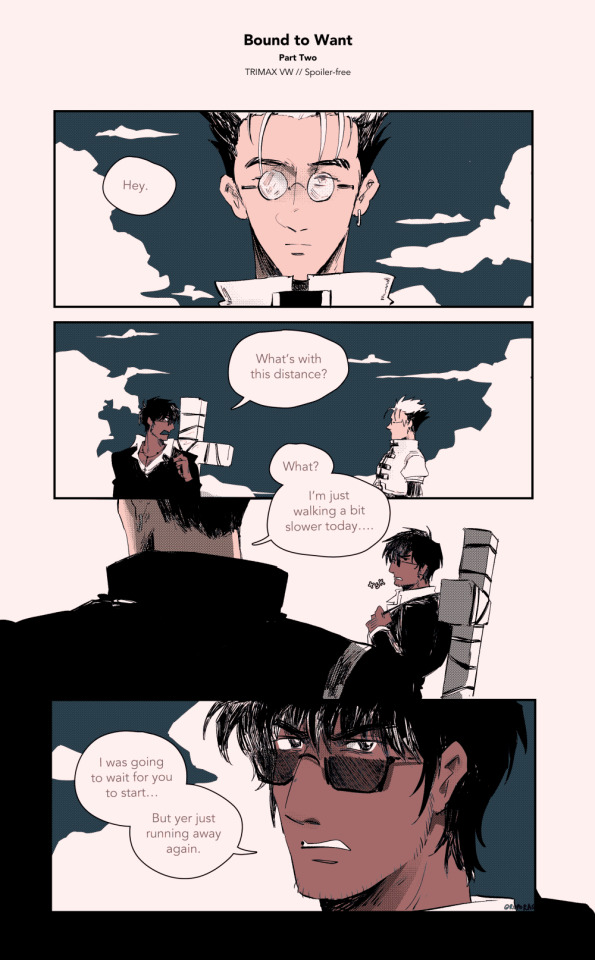



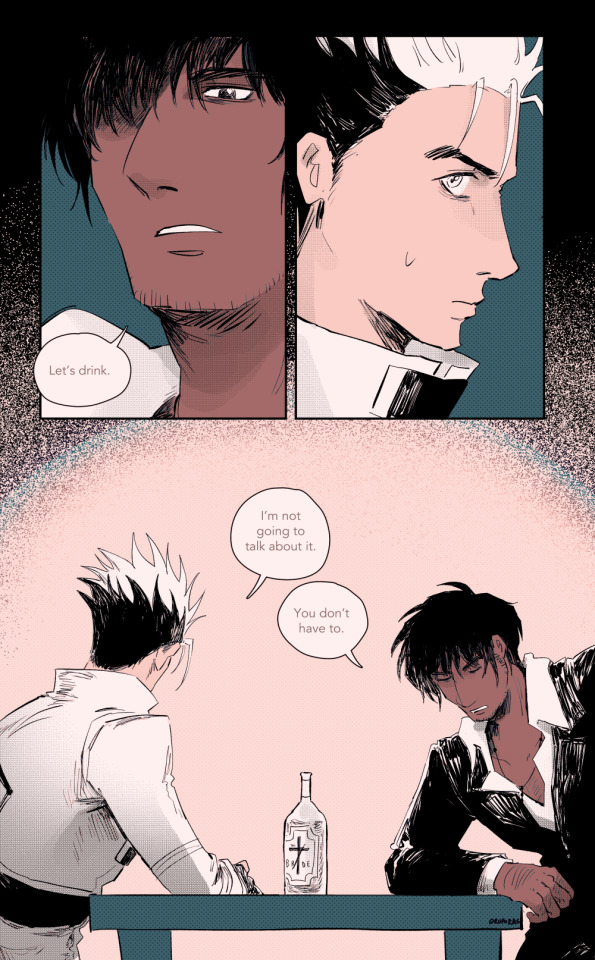
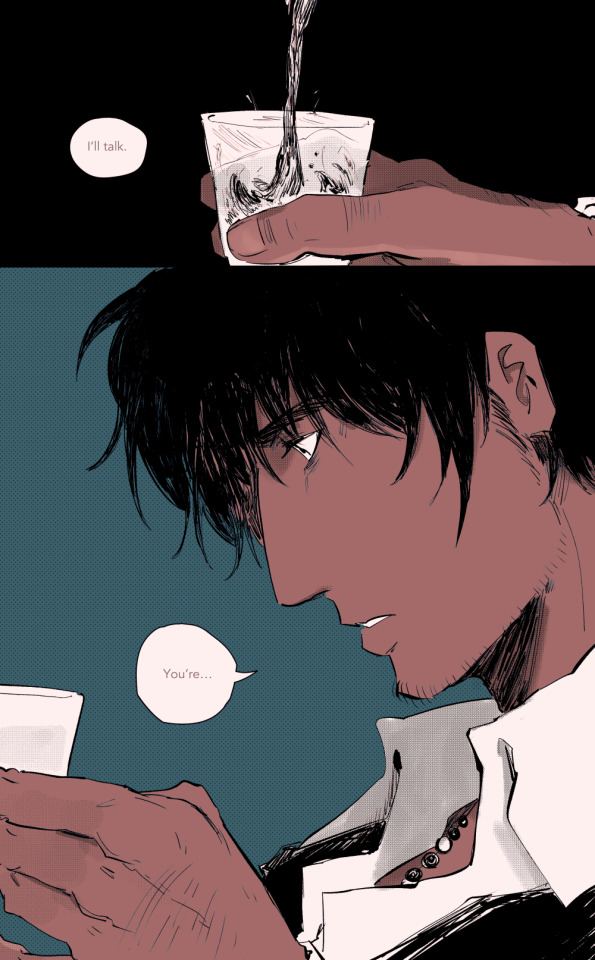
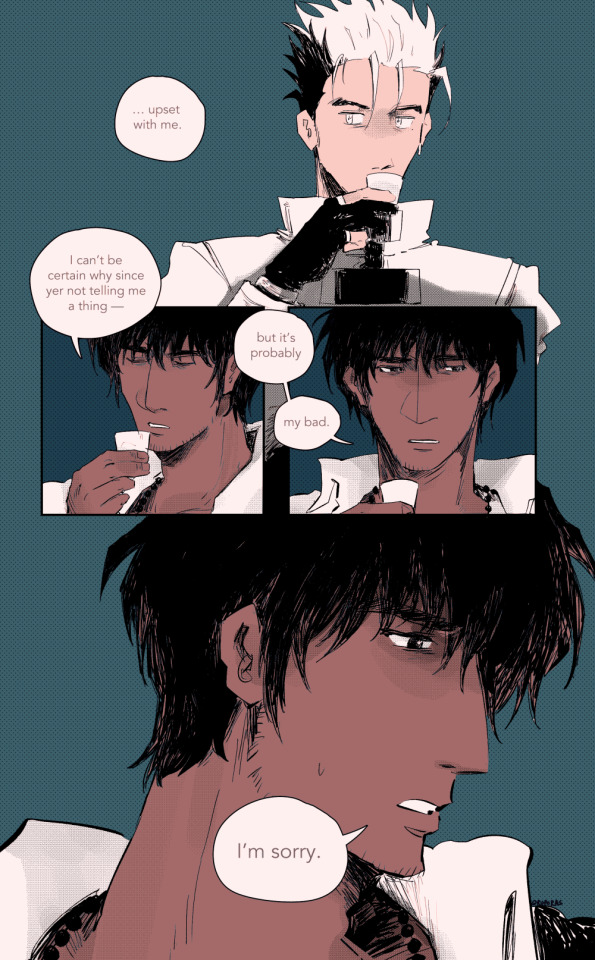

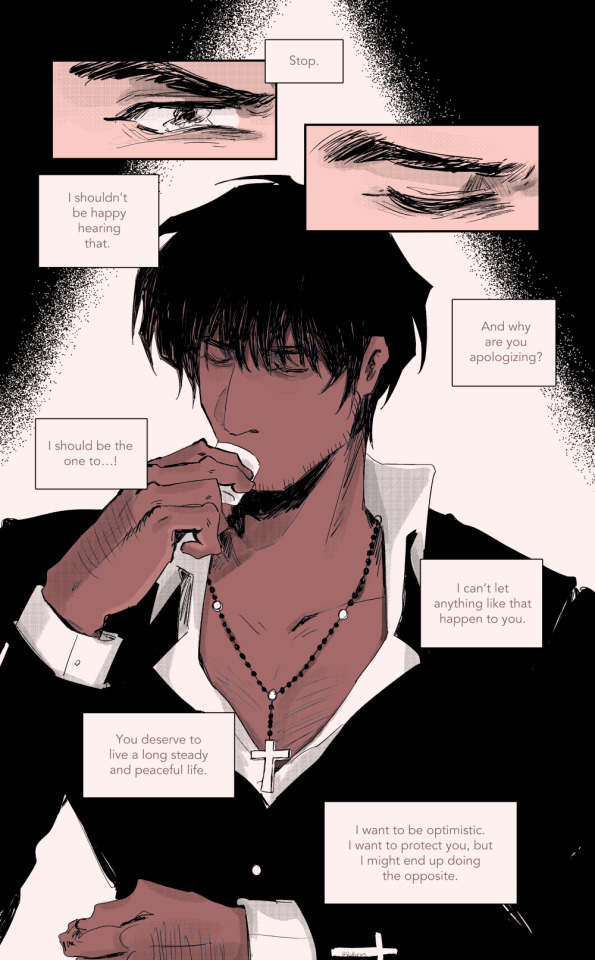
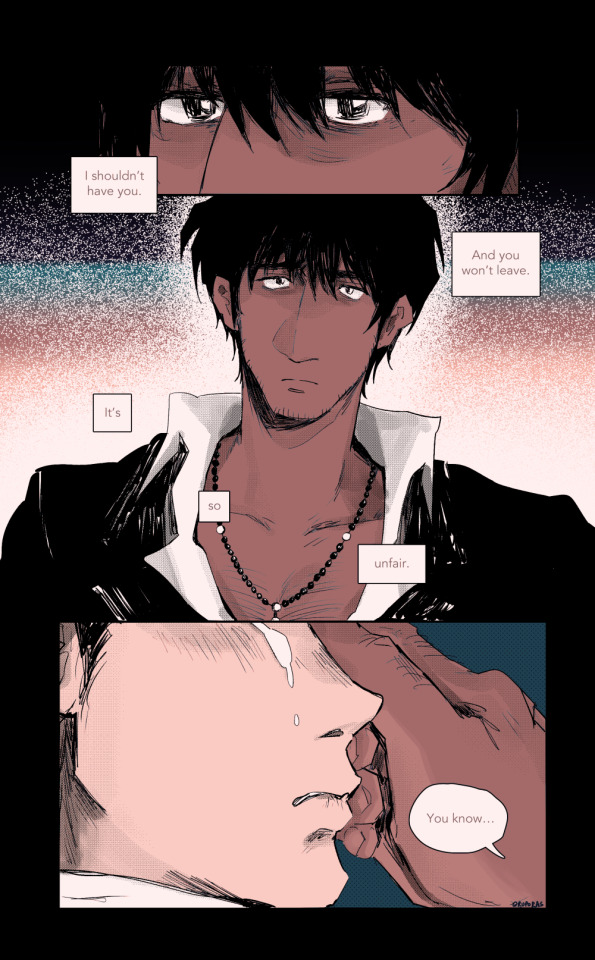
bound to want (part two) /// part one rest of pages under READ MORE after ID
[ID: 23 page digital comic of Vashwood from Trigun Maximum. The comic is in a limited palette of a dark blue, light pink, white, black, and a light beige color for Vash's skin and a mid-brown color for Wolfwood's. This comic is the second part to "Bound to Want" and is spoiler-free. The first part is linked here.
It begins with a panel close up of Vash's expressions. The sky colored in dark blue can be seen behind him. He has a neutral expression, but he holds a slight frown and the reflection of his glasses covers one side of his eyes. Wolfwood says, "Hey. What's with the distance?" In the second panel, the shot widens to show both of them, a clear physical distance separating them with Wolfwood walking ahead and Vash trailing a little behind. Vash responds, "What? I'm just walking a bit slower today..." Wolfwood looks at him with a an irritated expression, clicking his tongue. Wolfwood says, "I was going to wait for you to start... But yer just running away away."
Vash is seen looking away, unable to hold eye contact with Wolfwood as he continues, "You've been avoiding me since that night. Did ya think I wouldn't notice? It's about that dream, right? Tell me about it already if you're going to be moping like this." Vash looks slightly downwards, his brows furrowing and he starts to walk ahead of Wolfwood without looking at him and responds stiffly, "I really don't want to talk about it..." Wolfwood looks at him with a surprised expression, but doesn't probe.
A panel close up to Wolfwood's eyes as he watches Vash go on ahead before he follows suite with an irritated sigh. The panels are overlapped by Wolfwood's hand holding the bottle of the Bride with motion lines, indicating a transition in time.
A wide shot of Vash and Wolfwood in a room now. Vash is seated, his back turned away from the viewer, while Wolfwood's body faces the viewer with his eyes looking towards Vash. He rests the bottle of the Bride on the table with a "clack" and his other hand holds two shotglasses. The background is coated in a light pink.
A panel shows a close up of Wolfwood's face, his eyes looking downwards to Vash as he says, "Let's drink." Next to this panel is Vash looking up at Wolfwood, his brows furrowed and a slight frown. The bottom half of the page is a wider shot with Vash's body turned away from the viewer as he says, "I'm not going to talk about it." Wolfwood responds, "You don't have to." as he sits down.
A wide panel of Wolfwood holding the shotglass, pouring in the drink as he continues, "I'll talk." The next panel is a profile view of Wolfwood, his eyes looking down at the now filled shotglass as he continues to say, "You're..."
"... upset with me." Vash can be seen next to this speech bubble with narrowed eyes, looking towards Wolfwood. The panels are all coated in with a dark blue background. Wolfwood continues, "I can't be certain why since yer not telling me a thing -- but it's probably... my bad." The panels show Wolfwood about to bring the shotglass to his mouth but he turns way as he continued to speak, his eyes not on Vash. The bottom page shows him looking away completely with a guilty expression as he says, "I'm sorry.
If you can ever tell me why, I can try and adjust to make it more bearable. But if you're just trying to get rid of me--" The panels follow Wolfwood's certain expression as he says this, "I don't intend to leave you. I can't... and I won't." A panel shows Vash's wide-eyed expression, surprised upon hearing this, and then his eyes soften as Wolfwood again concludes with, "I'm sorry."
Vash's inner thoughts begins, a boxed speech at the center of the page and panels of his eyes, his brows furrowing again and a resigned, but frustrated expression. His thoughts starts, "Stop. I shouldn't be happy hearing that. And why are you apologizing? I should be the one to..! I can't let anything like that happen to you. You deserve to live a long steady and peaceful life. I want to be optimistic. I want to protect you, but I might end up doing the opposite." The text surrounds Wolfwood from Vash's perspective, the other man drinking out of his shotglass, his eyes downcasted.
"I shouldn't have you. And you won't leave." Behind these text is a panel of Wolfwood's eyes finally looking over to Vash. Vash's thoughts continues, "It's so unfair." When Wolfwood sees Vash, his eyes soften and he frowns. The last panel shows the lower half of Vash's face, but tears begins to flow down his cheek. Wolfwood's hand is already reaching to wipe at them as he starts to say, "You know..."
A wider shot of Vash and Wolfwood, Vash slightly leaning forward with his mouth tightly shut, and tears steadily continuing to flow out of his closed eyes. Wolfwood continues to wipe at them with his hand as he continues, "This isn't a dream anymore. I don't know what you saw for you to be this shaken up, but whatever happened, you'll overcome it, right? If not you, I'm here too. You'll be okay, Spikey. So..." Wolfwood's expression grows more tender, "Have a little faith in me... and come back already." The dark blue starts to fade.
The wide panel has the dark blue background faded and replaced is the light pink. It shows Vash in full up to his shoulders, his eyes are still tears littered, but there's light in them as he says, "Wolfwood..." making eye contact with the other. The next panel shows Wolfwood's tender expression, his eyes and brows fully soften and he has a small smile on his lips, finally seeing the other return a level of sincerity with him.
The next panel shows the bottom half of Wolfwood's face and his hand is offered towards Vash for a dance as he says, "C'mon. We don't have to talk, but this is okay, right?" The background is now white and a ribbon flowing across the page separates this panel from the next sequence. Vash's inner thoughts continus, "I've spent too long avoiding this. It's scary to want after I've taken so much from others." A sequence close up of their hands is shown, with Wolfwood's outstretched hand on the right and Vash's reaching hand on the left. Vash gently places his hand in Wolfwood and at the bottom, Wolfwood wraps his fingers across Vash's.
Throughout the page, a dark blue ribbon starts to flow around the both of them with confetti raining alongside the effect. Vash and Wolfwood are hand and hand, dancing together with Wolfwood as the lead. The viewer can see a peak of Vash's expression, full of fondness but also a hint of sorrow as he looks down at Wolfwood. His inner thoughts continue, "I don't deserve this. I don't deserve you. But why is that even though I have these burdens, I still want to love you. I still want you to be by my side."
With a close up of their mouths, Vash's thoughts continue, the text covering his mouth, "Wolfwood, I--" Wolfwood's speech bubble covers Vash's text as he completes his sentence, "want you." Vash's eyes widen for one panel and in the next, his eyes spark, a blush appearing on his cheek and the confetti flows and spark. Tears ease up on his eyes again.
"Want me too already, Spikey." Wolfwood has leaned in enough to rest his head against Vash, a hand of his on Vash's neck, holding his nape and another hand pressed gently against his back. A ribbon separates this panel from the next, a mix of confetti flows across the page, as Vash envelopes Wolfwood in a hug too, holding him and his hand gripping tightly onto his back.
This page is just the ribbon flowly throughout the page on the white background, one white ribbon and the other a dark blue. Near the bottom, the ribbon envelopes each other in a loop. A conversation of Vash and Wolfwood is held over these ribbons, Vash starting to say, "What if I hurt you? What if you..?" Wolfwood responds, "You? How could you hurt me?" Vash, "You know what I mean... You see it everyday..." Wolfwood responds, "If you think I'm going to kick the bucket so easily, I suggest you look at me more closely from now on, idiot. I'm not that easy to get rid of."
The next page has the ribbon criss cross over the top of the page. Vash and Wolfwood can be seen in their dancing position again, Wolfwood now resting a hand on Vash's shoulder, as Vash takes the lead. Vash continues, "Well, I know that... I tried." Wolfwood responds, "But you won't anymore... since you want me... around, yeah?" Wolfwood's head cocks to the side, smiling with assurance, cheeks flushed. Vash looks at him with a wide smile and fond, loving eyes. The confetti flows across the bottom of this page and as it eases into the next page, it starts to disappear.
Vash responds, ".. Yeah... I do..." as he pulls Wolfwood into a hug again. Wolfwood says, "Not going to run away anymore, are you?" Vash says, "No... I trust you." A panel shows Wolfwood's turning away slightly with a shy expression, muttering "Geez..."
In a more simplified style, Wolfwood is seen gripping Vash's cheeks now with his hand, "Though... You do remember you avoided me for two weeks straight, right? How are you going to make that up to me?" Wolfwood asks. Vash responds with eyes closed and a pucker of his lips. A vein of irritation appears on Wolfwood's face. Wolfwood starts to squeeze at Vash's cheek with both hands, shouting, "Now that you've recovered, you're trying to be funny, huh?!" Vash says through the squished cheeks, "I'm just happy..."
The next page opens with a closed up panel of Vash's widen eye as Wolfwood's hand moves from squishing his cheeks to gently holding them and Wolfwood leans in. The inner thoughts starts again, "There's a chance I'm not making the right choice... My dreams, my fears of losing you, it will never go away. But you said you won't let it happen... And I want to hang onto your words closely this time. After all, if it's anyone who can make me believe, it's you." The white ribbon from previous pages flows across the page and it visibly ends at the bottom of the page, enclosing the two of them as they share a gentle kiss with Vash holding Wolfwood's face, a tear in his eye.
The next pages starts with Wolfwood saying, "You cryin' again?" Vash responds, "I'm just grateful..." Wolfwood responds, "But you've always had me." Vash responds, "Being like this is different from staring at you from behind all the time though..." The two can be seen together again, Wolfwood pressing his elbows against the table with Vash leaning over him. Wolfwood is easing the tears out of Vash's eye again, just like earlier. A close panel of Vash's fond expression is seen as he says, "Thank you, Wolfwood." Wolfwood looks up at him with a small smile, gentle eyes. Confetti starts to flow lightly across the page as text starts to appear against the white background, "I'm the one who's grateful...
That you'd embrace someone like me, when I'm not fit to hold you in the first place... But I know better than to hesitate. The moment I acknowledged it, I knew I'd spend the rest of my life loving you. So, have as much of me as you want, Vash."
The final page shows the confetti gently falling down the page and at the bottom shows Vash and Wolfwood pressing their foreheads together, Wolfwood's hands cupping the side of Vash's face gently, and both of them smiling brightly with each other. ID END]
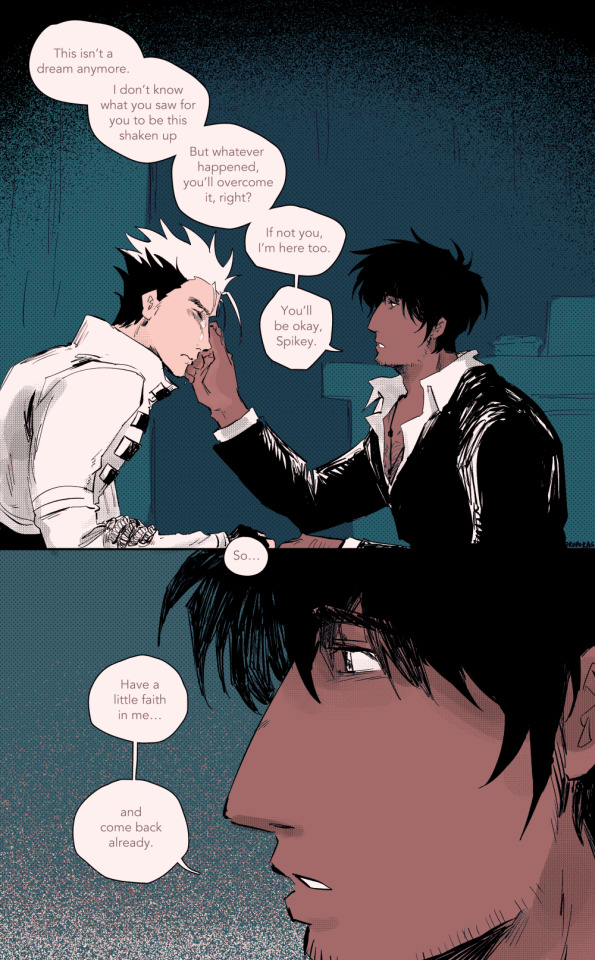

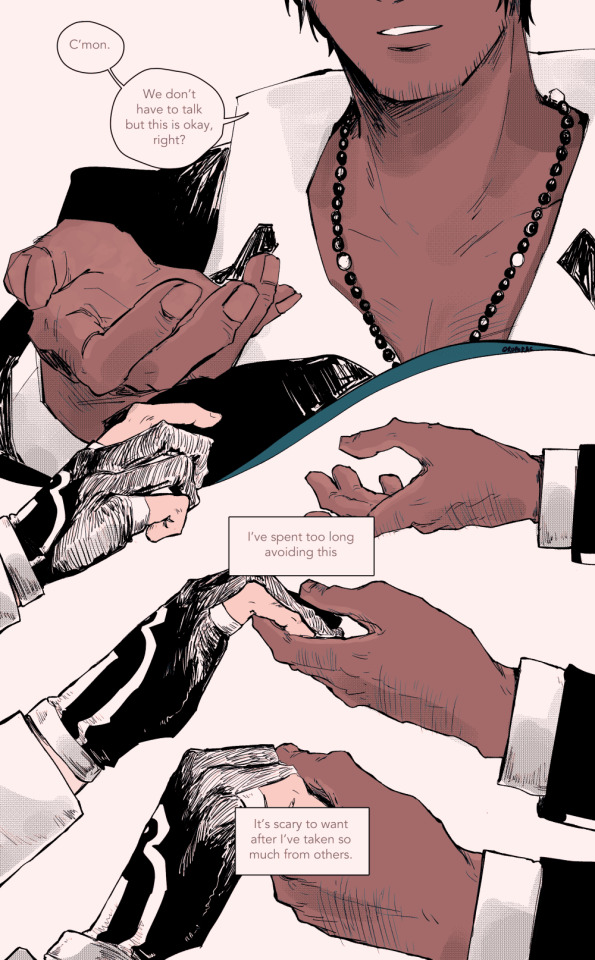

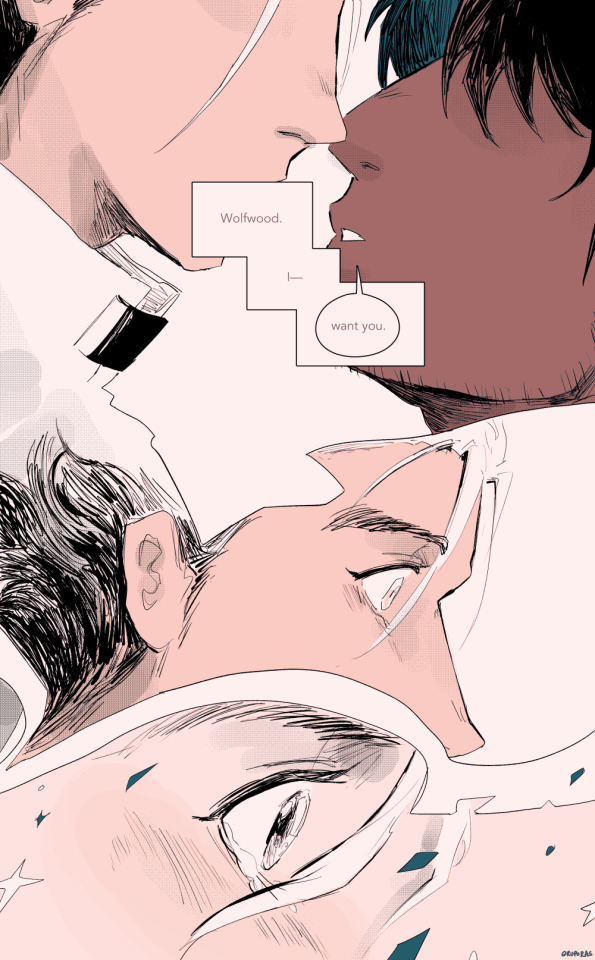
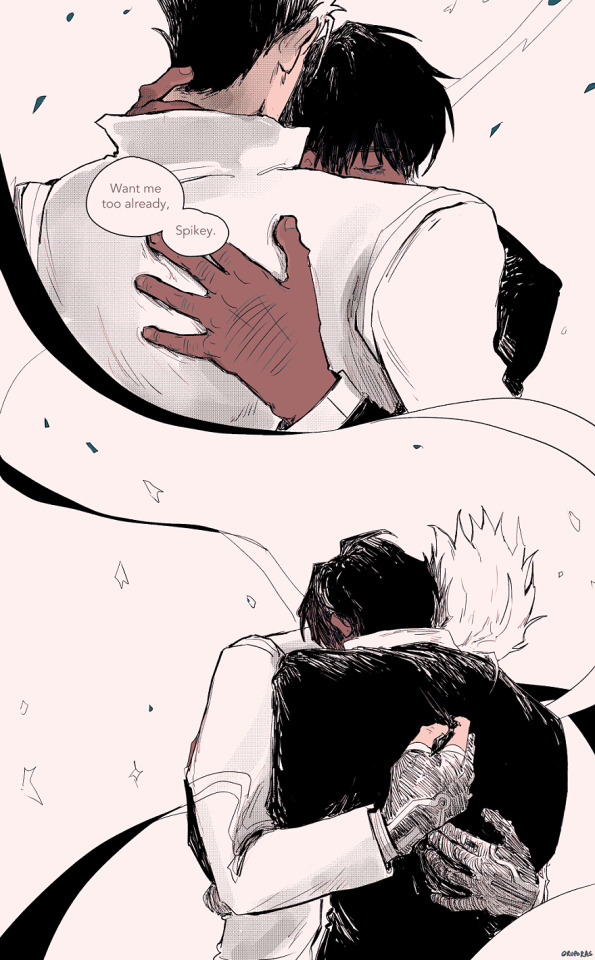
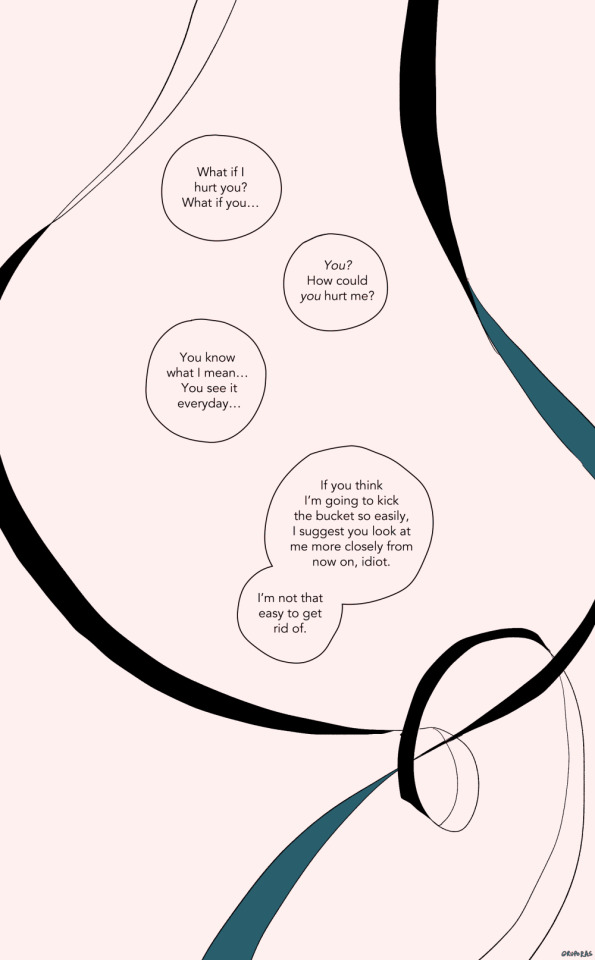
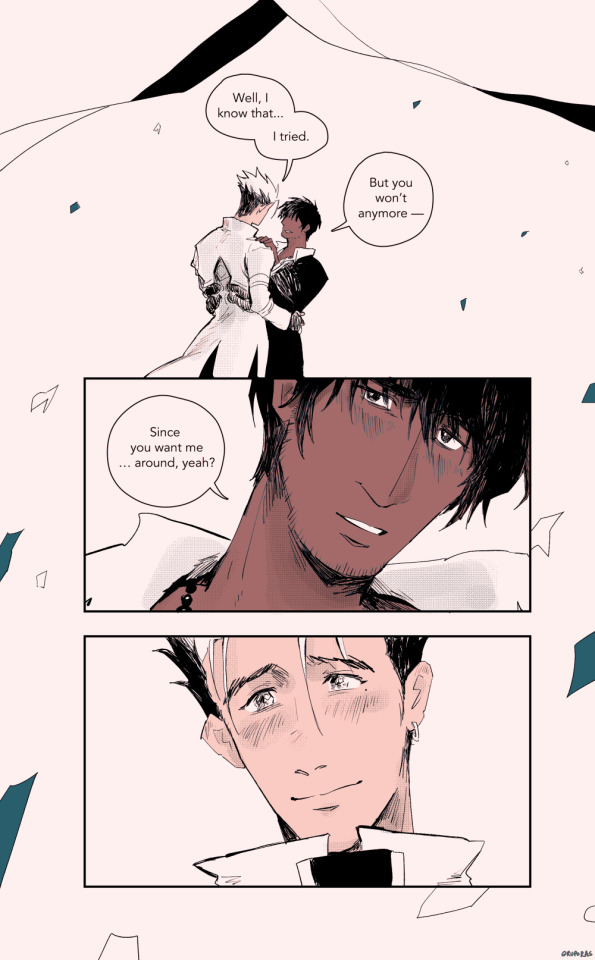
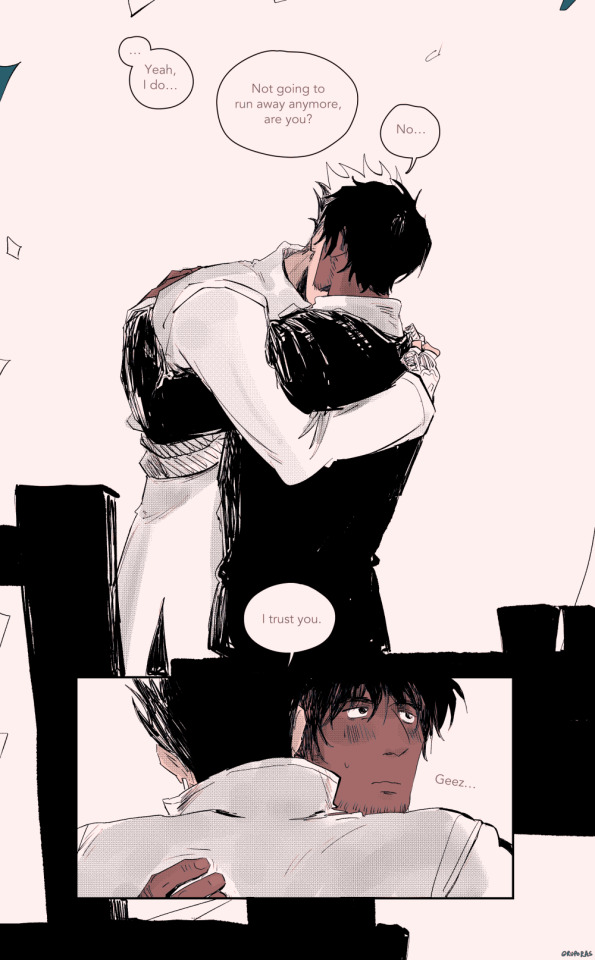

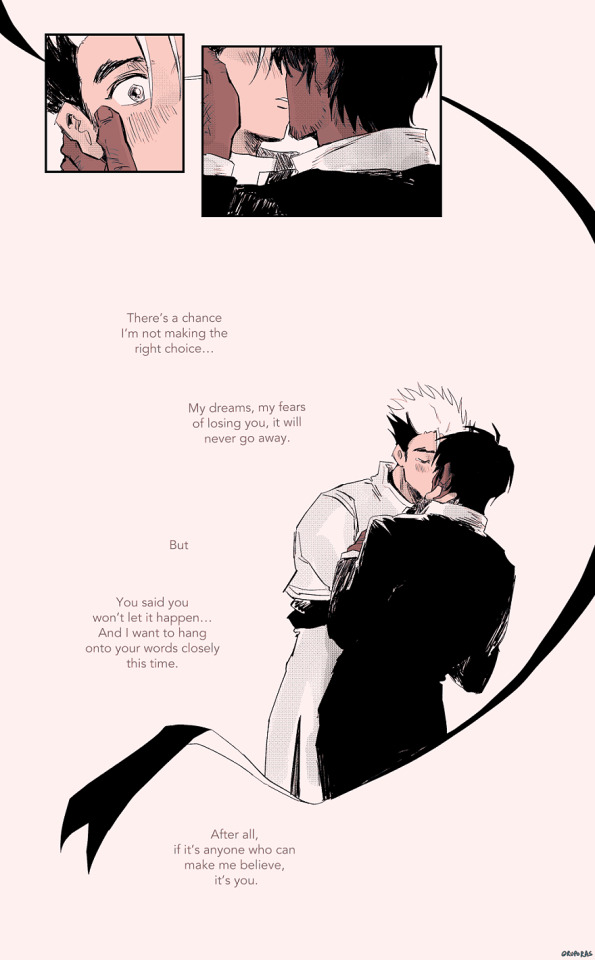
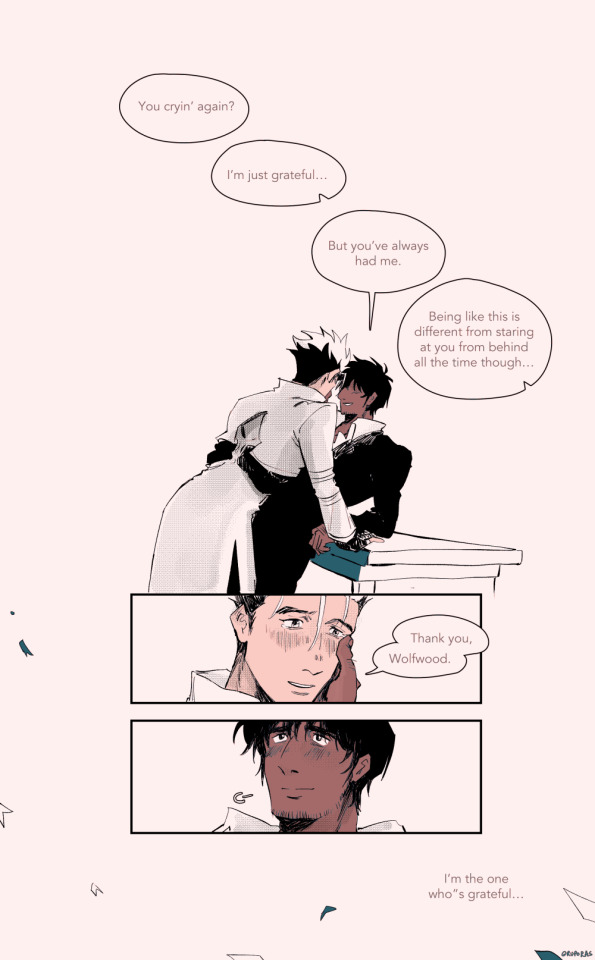
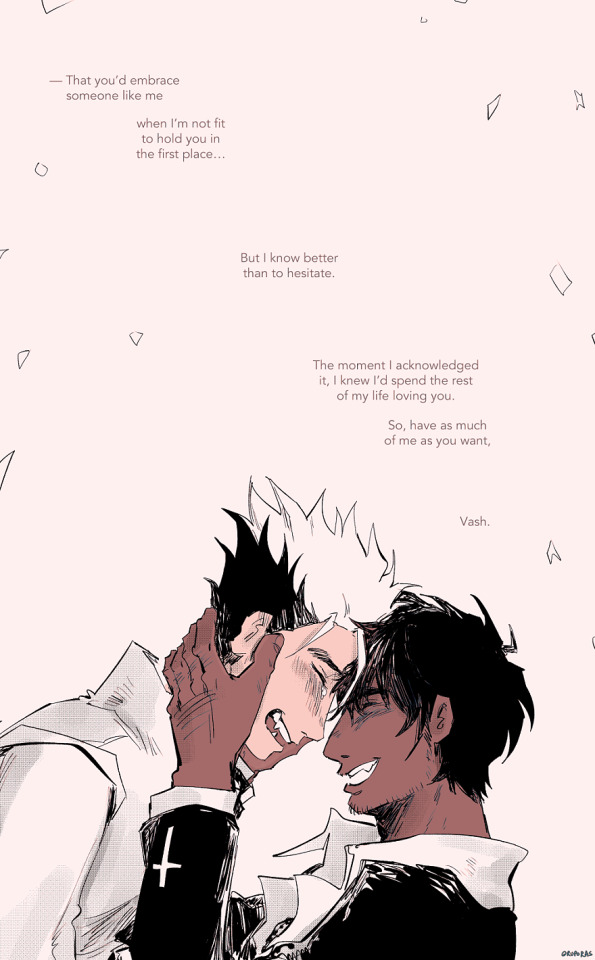
#vashwood#trigun#trigun maximum#vash the stampede#nicholas d wolfwood#its done.... after 2 months.... collapses on the ground#theres a lot of things i would prob change about this but. its so sappy that it makes me a little happy where it ended up#they deserve a little sap too!!! and in the end this is the closest they could get to a first confession#through want! want in each other's life and company since they both have this strained relationship with keeping people permanent in their#lives... and the people or things that are tied to them in the long term tend to be something that harms them.#and as the saying goes -- good things never last! and im sure they prob gave up trying to find a good thing for a long time#vash managed to be found after the moon accident and got his good thing for a bit but even he prob knew itd come to an end eventually#ironically it was wolfwood that ended it. but he really just planted smth new for vash... and now they have some security#or at least vash does. or at least just for this one moment#a moment of bliss and feeling like they are deserving of love is so Fluctuating for vashwood#and ultimately i think wolfwood could only push onwards to initiate because he sensed there was smth vash wanted. and its just#naturally in wolfwood to give to those that he love#but anyway anyway.... i like to think in a sweet universe -- they had the chance to confess like this and got a little bit of time to#enjoy and share their company in this manner. to be a little less restrained and love each other freely#ruporas art
3K notes
·
View notes
Text
just had the thought 'in the end the most important thing varric taught rook was how to make a home for, with, and in other people' and then I had to go lie down on the floor and clutch at my head in unceasing agony for a few hours, as you may well imagine. hawke and the kirkwall crew........ in the end you kind of saved the world a bit in the most characteristically indirect and chaotic of ways. not by anything in particular that you did or achieved or accomplished (lmao imagine!), but just by -- having existed, and by the love that was always there, despite it all, in all its imperfections, even when no one was saved by it in the end. you're not here right now and you're not quite haunting the narrative but I hear your voices bickering and arguing and laughing from the other room. (and so, I think, does varric. all the time.)
'did you think you mattered, hawke? did you think anything you ever did mattered?' yeah actually, varric says with da2 and keeps saying through the series. you were here. and I loved you. and as it turns out that mattered more than almost anything in the world, no matter how long it lasted or how fucked up it was at the time or what else happens, because varric manages to pass that feeling, that intangible... home, that echo of you all as you were together, that love, hopefully the best parts of it, on to someone else for them to bring with them on their journey, with their family. and maybe the world will be kinder this time. you never know. merrill's line of 'Everything affects everything. We were born, a bunch of things happened, and now we're in a mess with our friends.' varric's greatest fear of becoming his parents. even through the wreck and the ruin of the world, ghosts upon ghosts upon ghosts of love -- malcolm hawke, who we never even see, but his life touched hawke's and hawke's touched varric's and varric's touched rook's and rook is passing it on to the family they're creating. the unbroken legacy of love shines through in ways that are stronger and stranger than any magic. help
#I woke up. I opened my eyes. this insight hit me over the head like the fist of god. what the fuck. what the FUCK#dragon age#dragon age: the veilguard#dragon age: the veilguard spoilers#dragon age spoilers#hawke#varric tethras#dragon age 2#dragon age meta#let me live please I've barely reached consciousness I can't deal with this#the kirkwall gang.#what if they were secretly the most important people who ever existed. just because they existed. and for the love that was there#yeah you know what? that's not the worst legacy in the world is it.#da:tv really is da2 2 in some key ways. to me. one of the most da2 lovers or all time#also extremely da2 and also varric core for varric to adopt a kid (as a full adult) completely alone with hawke possibly dead#and STILL somehow manage to make it a varrichawke lovechild on some level. not romantic not platonic but something even more insane#every day varric is unbearably intimate with hawke through the narrative in ways he simply Cannot be with anyone in real life#(in ways you perhaps Should not be in real life. also. lol)#he keeps moving on no matter what b/c that's what you do. but I think varric's real home isn't even kirkwall or a place at all#it's a time. and that time is da2. or at least the story of da2 that he tells himself.#also also what about them themes around parenthood huh. I think varric in the end at least did not become his parents. thank god#trauma gets passed down. but so do other things and you have choices about what you want to leave behind#for those who come after you.#*tears streaming down my face* guess I have to go make breakfast and pretend everything is normal then. sick and twisted
126 notes
·
View notes
Note
What if Leo and Usagi kiss under a mistletoe. Will they actually do it?
(For those who have not seen the Christmas Aliens episode; Raph’s operating a movable mistletoe to help Casey get a kiss from April and Mikey is missing for most of the Christmas night, getting chased around the city by some thieves).

Well… no. Not yet anyway and for quite some time.
It’s 2004, world wasn’t very kind to gay people back then, or helped much with figuring things out for young queers (I would know, I was one). He still needs some time to precess. He just found his first best friend and he’s cool and strong and makes him happy and that’s all he wants to think about rn.
On the other hand feudal Japan was surprisingly okay with two men being involved romantically (despite the problematic side of things… good place to remind everyone 03 Usagi is a teen as well), so he’s a little confused by Leo’s mixed messages.
It’s okay, they’r still kids figuring things out. And when they will, there’ll be time for kisses.
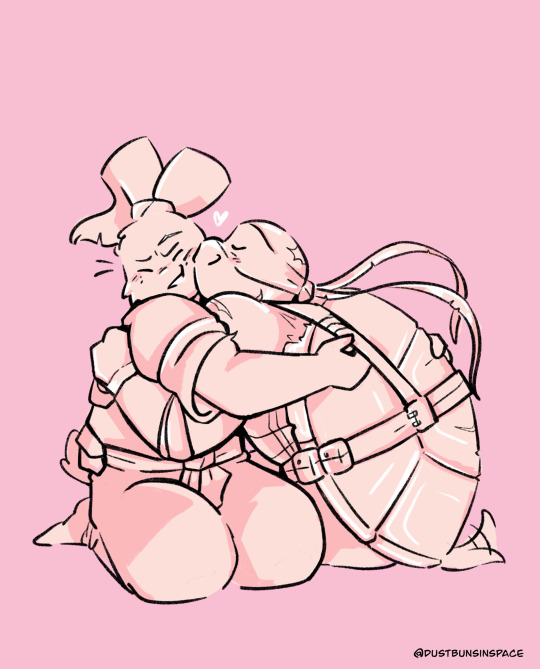
Comic that happens later that night (that I posteed before).
Part of 🟢 Leo gets Overwhelmed au🟢
#leosagi#03 leosagi#katana shipping#03 leonardo#03 Usagi#leo gets overwhelmed au#ens tmnt 03#thank you for the ask anon#<3#last comic not flopping horribly made me want to post about more this timeline#I was happy to keep it in my folders forever#because I made it for myself tbh#I’m healing my inner child by writing those#and listen it’s not Splinters fault okay#world just was like that back then#gay was a slur#a bad one#there was no representation in popular media#or if there was queer people were so exaggerated and weird or a straight out parody#you looked at them and was like#I’m nothing like that#guess Im straight#especially when you’re growing as a golden child of the family#straight hair straight a’s straightforward#you know the drill
460 notes
·
View notes
Text
hghhhhh... sometimes being transmasc is so alienating. i see all those posts about forcefemming the entire planet or how the world would be better if everyone was a girl and it kind of hurts. i get that people are just making jokes they find funny and im not mad at them or anything, but it kind of feels like they're telling transmascs and other non-women that it'd be cooler if they detransitioned. idk it might be a me problem but ive seen far too many people get mad at transmen for being men to not feel the sting anyway. i like being a man! there's just a lot of pressure out there to... not be one. and that sucks.
#transmasc#vent#im not calling it transandrophobia because i know people making those jokes arent directing it at transmascs im just venting my own thoughts#i have the forcefem keyword blocked but stuff still keeps getting through. makes my dysphoria worse.#yeah haha youre so right person saying the world would be better without men! i should kms!#because id rather die than detransition which it seems like you want me to do!#sigh. i wish i didnt feel like i was betraying women by not wanting to be one.
65 notes
·
View notes
Text
one thing i really wish people wouldn’t forget when it comes to suguru’s character is that his core desire is just to have a family. not in a nuclear family way, but in a “i want a place where i belong / i want to protect the ones i love” way…… literally everything else is just an extension of that desire. a means to meet that end. he broke down after being forced to realize that staying with his family meant having to watch them die, so he left and made a new one. and he got stronger. and his core wish was always, always always to create a world where he’d finally be able to protect them :(((((((((
#don’t get me wrong geto is absolutely twisted and deluded and downright cruel#and that’s not something you should or could look away from when analyzing his character#but i also think it’s wrong to look away from this part of him because it’s in EVERYTHING he is and does!!!!!#one of the big tipping points for him was the realization that being a sorcerer meant choosing civilians over his family#he just wanted a place where he belonged. he just wanted his loved ones to be safe#suguru is very very selfish at his core and a big part of that selfishness is connected to those desires#he protects His People. his family.#he loves them so sincerely and protects them so fervently#idk it’s just . easy to forget i think. because cult leader geto is bitter and sad and pathetic#but he also has such a sincere love for those he keeps close and i think that makes him sooooo much more interesting#like yes his goal was stupid but that goal was never the actual point. he just needed it to keep himself alive#he needed something to give his actions Meaning#and the something he ended up settling on was the idea of a world where he could protect his loved ones .#and that says soooo much about him…..#sorry i woke up thinking of him </3#my princess 😔😔#ari noises ✩
278 notes
·
View notes
Text
[A sad violin song plays over an image of a sad hamster]
Pac: This doesn't have anything to do with me – I wear a blue sweatshirt, you're crazy, this mouse doesn't even have a sweatshirt, this hamster! [Reading chat] Am I a depressed hamster?
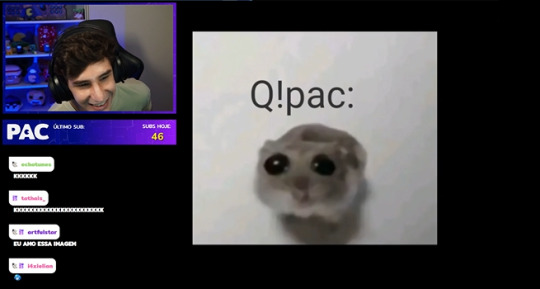
[ Transcript continued ↓ ]*
–
Pac: Actually– that's fine! I embrace that idea – of course I'm going to be depressed, are you crazy? [He hits his desk, then starts counting off people on his fingers] Fit is gone, Richarlyson is gone, Ramon is gone, Bagi and Empanada who were always there when we were there are also gone, I haven't seen them! It's just me and Tubbo, and sometimes Philza shows up.
Pac: I lost Chume Labs, I lost the Favela, I lost Murder Mystery, I lost Ilha Chume Labs, it's crazy! Look at how much I've lost, and I've gained nothing! Of course I'm going to be depressed, are you crazy?! How am I supposed to be happy?!
Pac: [Reading chat] "You have us Pac," that's true, thank you. No, that's true, sorry.
* NOTE: Please note that this is an incomplete transcript, as I was primarily relying on Aypierre's translation mod at the time and if I am not confident of the translation, I do not include it. As always, please feel free to add on translations or message me corrections.
#Pactw#QSMP#Pac#March 18 2024#As much as I love keeping people updated about Pac / the other Portuguese-speaking creators#I think I might not make as many transcribed posts for their clips anymore#I just don't think I'm qualified enough to be transcribing things for a language I don't know#like yeah we have the Qlobal Translator and Aypierre's translators to rely on#And I'm always upfront when I'm not 100% sure about a translation#but I've been thinking about it a lot and it kinda makes me feel a bit icky. Idk.#I might be overthinking this but I just I don't want to spread around translations I'm not super confident about#esp. since I know a lot of people cite my clips in analysis posts or link them to other people as resources#and 90% of the time I'm like ''Hell yeah I love seeing people getting a lot of use out of the archive''#but sometimes I get a bit anxious like ''Did I do a good enough job translating this''#''Am I ruining someone's entire perception of a conversation or character because I left one word out or mistranslated something?''#And like I said that's normally not a HUGE concern since if I'm not certain about a translation I just won't post a clip. but you know#idk it might just be the anxiety talking but I really really don't want to spread bad info#Happy to hear other folks' perspective#I'm really grateful for people like Bell and Pix and others who translate clips and I always try to reblog those#but we don't have a ton of people posting clips & translating things on Tumblr since we're so English-centric#which is part of the reason WHY I like sharing clips of the non-English-speaking CCs#but at the same time I want to do an accurate job representing what they're saying#Maybe I'll just start posting things and give a TLDR context of what they're talking about but not a transcript#that way native-speakers can hop in and add translations if that's something they're comfortable doing#and if not then well. at least I'm not sharing something that isn't super accurate#idk I'm just thinking out loud a bit in the tags#But I'm open to hearing other people's thoughts on the matter#Anyways giant rant aside. q!Pac is NOT doing ok rn
252 notes
·
View notes
Text
Was forced to watch a truly incredible (derogatory) thing recently.
A young person on twitter, adamant that transandrophobia doesn't exist on the grounds that 'no one is killing/raping/assaulting trans men'.
Several people responded, including some linking articles about murders and assaults on trans men and a couple op-ed style pieces of trans men talking about their own experiences.
Said young person responded with "I'm not reading those its triggering and I'm a minor"
So let me see if I've got this correct, you are knowingly refuse to acknowledge reality because it's upsetting to you and then you're going to turn around and deny that very reality because you refuse to acknowledge it because it's upsetting?
#like I'm sorry but willful ignorance is not a winning argument?#transandrophobia#its things like this that really have me convinced that we're never actually going to fix this shit#i was talking to the woman who runs the lgbt center i was going to#shes been running it in some capacity for about 30 years now#and she was saying that ever since they reopened after covid they have a problem getting people to keep coming#and its mostly because young people will come a few times and then something makes them uncomfortable and they never come back#but the things that make them uncomfortable are things like 'a homeless kid came to get a shower and a meal'#or 'the donated instruments in the music room arent good enough quality and they dont want to use poor people instruments'#those are both real examples btw#i hate to be the one to say it#but you cannot form community if you refuse to be uncomfortable sometimes#op
762 notes
·
View notes
Text
i have been a ball of depression lately as well as my physical health worsening pretty severly this past week due to stress and so my friends have been. trying so hard to get me to get out and do things and its very sweet but i feel bad because the whole time i’m just a total mess
#they say they dont mind but i need to really. stop#im stuck.#and i know it’s hard on my friends to see me like this since i’ve been doing a lot better and now am back to my old habits#but i felt bad because they took me out shopping and to dinner tonight and i just had a headache and was limping and couldnt stop talking#about the recent death in my family and all the stress from classes and socially and how lost i feel#and i just wanted so bad to just. enjoy myself but i couldnt#but my friends know about how severe my depression is and are all very used to it#its in fact more normal than not. but i was really. feeling at my best for several months so the crash back down to not eating and sleeping#and being unable to fully tidy my room and all that stuff has been. difficult for me as well as those around me#it’s been normal for me for so long to live terribly that taking care of myself for a while and then losing the drive to has been. hard#im trying to get better but i slide back down#i need to work on my constant self loathing but i keep walking around just. conviced im such a burden and being sad makes it even worse#i just. am always overcompensating for my lack of#ability to love myself with just. constantly showering everyone around me with love and its. hard for me when i dont have the energy to do#even that anymore. its hard to let people take care of me when i just want to take care of them all the time
73 notes
·
View notes
Text
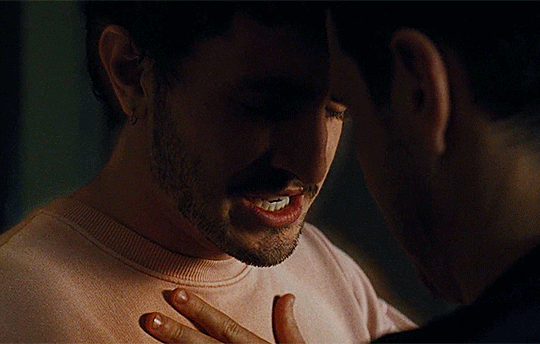
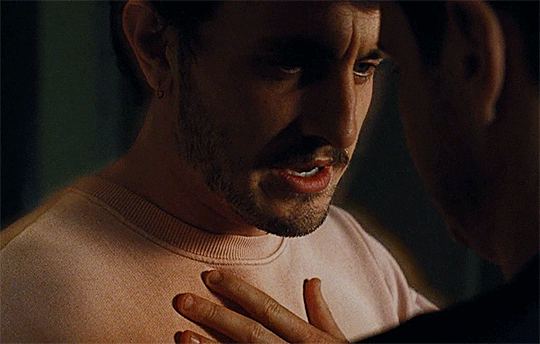

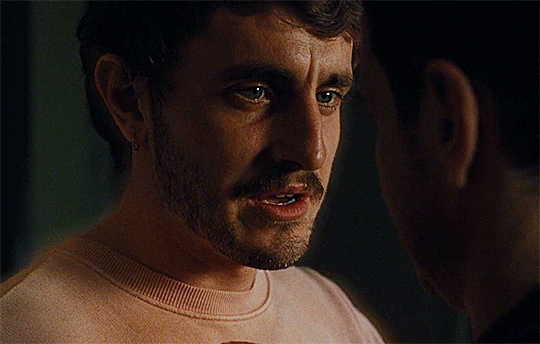

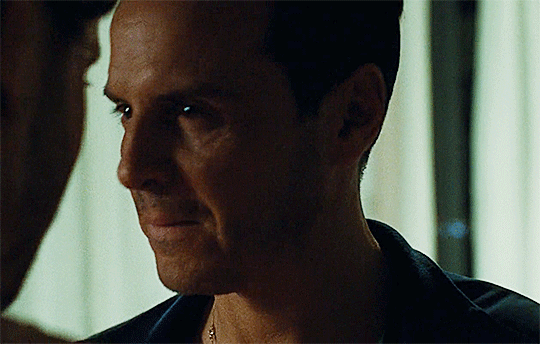
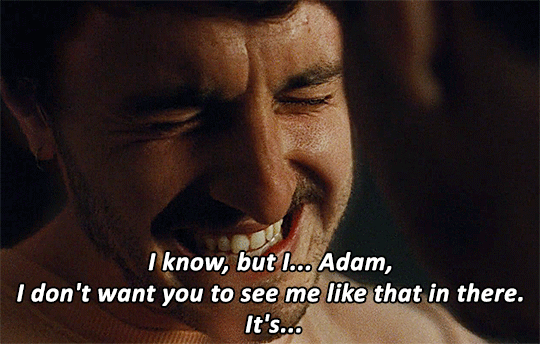


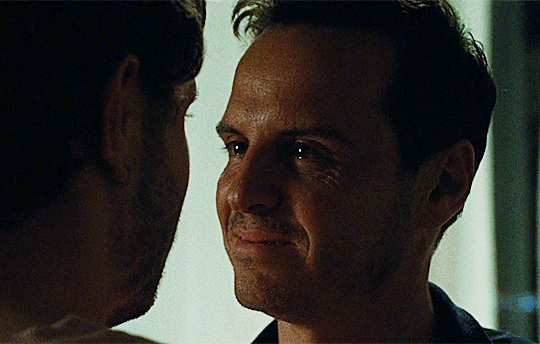
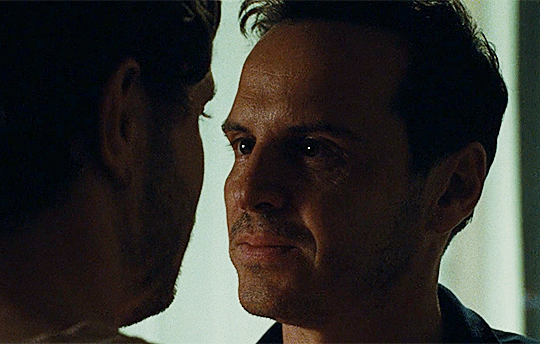

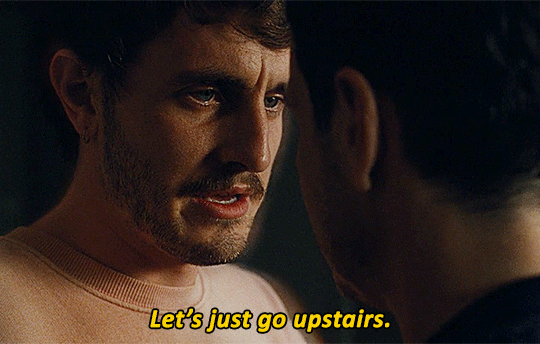
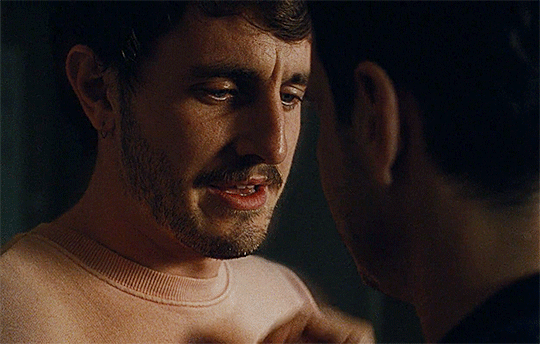
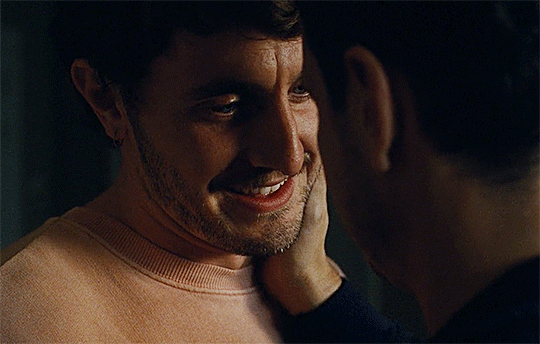

ALL OF US STRANGERS (2023) dir. ANDREW HAIGH
#filmedit#filmgifs#movieedit#moviegifs#All of Us Strangers#aousedit#filmtvdaily#filmtvcentral#cinemapix#fyeahmovies#dailyflicks#mine*#mygifs#movies*#I can't believe this is done. and you won't believe how long it took me to make it. insane... because it's just a scene#I didn't even use different fonts. or a cool template. or transitions... it was a single scene... but look... I made captures for 10 gifs#and things kept happening and I kept finding little gestures and beautiful things and I just couldn't keep them out the gifs#I mean look at Harry and that slow realization. please look at the glow around his shoulders at the beginning#and how ethereal and out of this world he already is AND THEN when Adam says 'I found you' he becomes more... real and present!#and those eyes and the intensity of that 'you're here' and their eyes and faces and smiles and how Harry's desperate but Adam calms him dow#and his voice when he asks 'how come no one found me?' the realization that people didn't care to check on him. it screamed to my soul#I haven't stopped thinking about that scene since the moment I first watched it#honestly... I wish I could live in this scene forever#now this is a super long post and I know it won't get many notes and it was surely made before... but I needed to make this for myself...#so here it is :) I'm tired but I love it#GOD the way Harry goes full baby when Adam caresses his cheek and he SMILES LIKE THAT! AHHHHHHH!#*runs down the hill screaming*
156 notes
·
View notes